#* . . . the puppet master pulling the strings | commentary.
Text
* . . . smash the heart for a short thing !!!
8 notes
·
View notes
Text
so i‘ve started rewatching succession and I have thoughts. @garliclesbian and i were talking about it when watching the s3 finale: how it’s a brilliant commentary on how an abusive family situation, you get so caught up in the machinations of power, get so used to the Machiavellian logic of what are you trying to take from me? what’s the angle? (what do you have in your hands?) that you lose track of who‘s actually pulling the strings. the roy siblings never forget who‘s making the rules, but they forget that the puppet master is a player, as well. and as the audience, so do you. we focus so much on how logan made the kids believe that to come out on top, to have something you have to take it from someone else, that someone else‘s power is your powerlessness, in such a Lockeian logic of man being a wolf to man, that they fight each other like dogs, that they are wary of each other even when they should know better. it’s quite typical of narcisstic abuse: you pick a scapegoat and a favorite, and you have them fight each other always in what they think is a fight for who comes out on top, but really none of them will because the point is in the diversion: if they are busy tearing into each other, they can’t see that the game was never designed to be winnable. the point of the game is the game. and so they fight and push and maim and it never gets them anywhere, they are treading water, and every action they take gets them further and further from each other and thus further and further from actually seizing any power for themselves. it’s classic fucking game theory, it’s a prisoner‘s Dilemma in which the doors are locked and the room empty and of course they‘ll never cooperate. they can’t. to maximize gain you sell out the other player. but he sells you out, because he can’t fathom a world in which you don’t. you’ve both been taught that the other is a wolf. you are each other’s wolves. and so neither of you wins. the only move is mutual cooperation, and yet it’s the least likely to be taken. because when you’re right down in the middle of it, what could be seen as less rational than to trust a killer? and why does this work? because you can’t talk. because you are prisoners locked in different rooms and being fed the same fucking story. because your dad has you locked in a perpetual state of fight or flight, and to hesitate, to think, to talk is to die. and of course the only option is to break the door and work together. and it’s only when the siblings begin to do jsut that that they see that logan never wanted any of them to win. the game was rigged from the start because of course it was. logan says, i win, and it’s only then that they, that we see what should have been clear right from the start: logan‘s been playing the game all along. and we should have known from the pilot: ken does it all right. he does the work and picks the major, he plays by the rules and when they get him close enough to actually come out on top, logan changes the rules on him. because the fight is only amusing when no one comes close. it’s only when he sees ken on that cover that he thinks, how dare you? what are you trying to take from me? because logan had a logan, probably, he‘s been weak and hurt and tired, and he’s made himself the big man, the untouchable man. of course he‘ll never give it up. because when your whole entire life is power for the sake of it, power to keep the fear at bay, when you’ve learned that all that keeps the wolves outside is a leviathan, the act of letting go is to bare your belly, to surrender. and you think that to be vulnerable is to be dead, already, because all you know is wolves. it’s brilliant because the game keeps itself alive: you learn that people are wolves, and so you become a wolf, and then, you treat people like they‘re wolves, and that’s what they become. logan made them wolves. and now that they are wolves, he can not let them win. and it’s so clever, because isn’t that the crux of locke’s leviathan? if people are power hungry wolves, is the ruler not a wolf?
12 notes
·
View notes
Text
11. Preaching to the Choir
A continuation of 4. Baleful
The Southern Front was quiet that night, save for the chirp of insects and the far off rumble of engines.
The air was like breathing in hot syrup, though. Remeraux could feel it sticking to her skin, turning the inside of her armor into a swamp. Perspiration collected on her shoulders in rivulets, to trickle clear down the small of her back and right between her asscheeks. Unpleasant. She squinted her one good eye (her swollen eye came pre-squinted, and it smarted something fierce when the rubber eyepiece bumped against it) through her binoculars as she made another sweep of the battlefield. Leaning her elbows lazily against the burlap sandbags that made up their post, she drummed her fingers against the binoculars with one hand while the other went to fiddle with the focus. Her gaze settled on a squat little warmachina, creeping over a muddy ridge on its four flat discs of feet. Remeraux always thought those ones looked a little like ducks, at least in the face. A glowing blue lens made for an eye on either side of its 'head', and a perforated dark metal barrel for a beak. It was scurrying a little too close to camp for her liking.
“Nimrod. Eleven bells. Roundabouts… two malms out, I reckon.”
Remeraux’s voice was the first sound to break the silence.
“On it.”
The second sound, another voice, in reply.
The crack of a rifle, ringing a little in Remeraux’s pointed ear, was the third.
Through her binoculars, Remeraux watched the bullet find her target. Right through that shiny blue lens, exploding that glass into powder. It sputtered sparks and blue flame from the jagged impact crater, and like a puppet separated from its strings it ceased to move. The coast looked clear enough, after that. Remeraux kept her vigil for just long enough to check for any moves of reprisal. It was a relief to find that their enemy was fine to let them take a pawn of their own, for the time being. She lowered her binoculars and withdrew for the moment, sliding down the wall back down into their foxhole.
Remeraux fiddled in the pocket of her thick, armored coat for something as she watched the woman next to her take her knee off its perch on the edge of the sack wall, exiting her perfect rifleman's stance. Joining her within the confines of their cozy little pit, she lowered the butt of the rifle, rich woods and dull metals, to the ground at her side. Remeraux found herself having to crane her neck up ever so slightly to look at her, despite how similar they were in height. It was probably because, unlike her, Misija wasn’t leaning against the wall.
Now that she thought about it, Remeraux wasn't sure that she’d ever seen the woman so much as slouch.
“Chocolate?” Remeraux asked, as she produced a foil-wrapped square from her pocket. She put the fingertip of her padded gauntlet between her teeth and yanked the whole thing off. She wasn't fussy enough to not just open her mouth when she'd pulled her hand free and let the gauntlet just drop right to the floor (just a series of planks pressed into the wet earth). Freshly dexterous, Remeraux unwrapped the foil with grimy fingers. She broke off a messy square of the pitch-black bar with a snap, and held it out to the pale Roegadyn, who just gave a nod in the affirmative and took it first into her hand, and then her mouth. The corners of those equally pale lips turned up, just a hair. Remeraux nodded, smiling in return. She didn’t manage to get many of those from Misija, although to tell the truth they'd only started spending time together recently. But, she had taken plenty of opportunities to glance at her: from across the sands of Gangos, from the other side of Utya's Aegis when she was busy with the Ironworks staff and Remeraux should have really been focusing on taking inventory.
Something about the quiet intensity she radiated, steel eyes like searchlights, gave her the feeling smiling wasn’t something she did often. The few times Misija's own gaze settled on her, though, always made her stomach tie itself in knots. It was definitely doing so now. She distracted herself from the sensation by breaking off her own hunk and shoving it in her mouth. It was shitty chocolate, bitter as sin, but it was better than anything they’d had to eat in a while.
“How’s your eye?” Misija inquired, crossing one arm over her other. Remeraux waved her off nonchalantly with her free hand, as her jaws worked through the dense matter. She swallowed.
“Better than his, I reckon. Fer a soldier, bastard couldn’t throw a punch ta save his life.”
The two women shared a chuckle, briefly flashing teeth smudged with dark chocolate. It was funny, Remeraux thought in the moment before the expression faded from Misija’s face like a snowflake that just touched ground. Usually teeth were the only thing that shone white in faces turned to a sea of brown grime, out there on the Front. For Misija, it was the opposite. Grey hair on grey skin on grey eyes on grey lips. The chocolate on her teeth was the only splash of color present on her face.
“You really didn’t need to get involved, though.” Misija exhaled through her nose, those searchlights of hers scanning Remeraux’s face as if they'd find their answers by scouring them from her skin. “My honor is not a thing that needs defending.”
Remeraux rolled her shoulders. She can’t help but inevitably brush against her ears with her shoulderpads with the gesture, they were just that big. The ears, kind of, but mostly the shoulderpads. “Ain’ just fer you. Don’t stand fer that kinda talk around me. Learned ta punch ta get it to stop a looong time ago.” She chuckled, just a few sharp exhales out of her nose, and popped another square between her lips. She extended another to Misija, who broke off one of her own.
“...The Star may have its depths of cruelties, but few of them are novel, it seems.” Misija mused, her eyes appraising the chocolate as she tilted it side to side between two fingers, before putting it into her mouth.
“Ye’re tellin’ me….” Remeraux just sat in the evening's silence, for just a moment. “Ta find it true o’ Bozja though... that was a bit of a shock, I gotta say.”
The corners of those pale lips dropped back down to a line. “Well. Consider yourself informed.” It was a level response, matter-of-fact and cold. More silence. More chewing. Remeraux couldn’t stand the quality the silence had taken on forever, and was the first one to break it.
“...I know, I know. A mite naive, I s'pose” She shrugged, apologetically. She ran her tongue across the front of her teeth, picking up stray bits of sugar. “Jus’... grew up on folk tales, about it. Bozja, that is. From me mum. An’ she was the child o’ refugees, so I guess the truth got a bit stretched in the tellins." Remeraux scratched the back of her head awkwardly, dragging her nails through short-cropped hair drenched in sweat. "But a kingdom under the sun an’ sand… A goodly queen, loved by her people… An’ a 'fine republic' af’er that.” She sighed, looking around at the wasteland of a countryside. What few structures remained, south of the old ruined capital, still half-melted into crystal at their tips, blasted back and frozen in a photograph of the devastation. ”Even if it was over before my time, it was a nice thing ta hear tell about.”
Misija just took the words in, providing nothing in the quality of her expression to act as commentary. “A nation’s truth is never the stories that it tells about itself." She said pointedly, before turning her eyes back on Remeraux. "Judging by the way you responded to those soldiers, I wouldn’t guess you exactly believe in Ishgard, the good King Thordan and his knights twelve, and the mandate of the Archbishop, blessed first among Halone’s Children…”
Remeraux cocked an eyebrow. Misija just shrugged.
“Unless my intuition is mistaken.”
“Is there somefin’ about my face that just screams Ishgard?” Remeraux gave Misija a playful punch on the shoulder, and got another smile, however slight, out of the woman. "Izzit the ears? The teeth?"
“Mostly just your name. Although I’ll freely admit to having no firsthand knowledge of the place. Imperial education may be broad, but it was rudimentary in some areas.”
Another pause for chewing.
“...Imperial education?” Remeraux asked, as neutrally as she could make the words sound.
Misija gave those silvery eyes a roll, and held out her hand for another break of the bar. Remeraux obliged.
“Don’t look so surprised. Basjalsen himself was a Legion field medic for years. You’ll find that many members of the resistance first lived under the Imperial yoke before turning against their masters.”
Remeraux just shoved the last bit of the chocolate bar in her mouth. The bitterness of it made her salivate something fierce. It was welcome relief from how quickly her throat dried out nowadays, in the moon since... since the gassing.
And it was a better thing to put into her mouth than her own foot.
“...What was it like?" Remeraux mumbled the words from around a cheek full of the candy. "Imperial schoolin', I mean."
“It was… a lifeline.” The way Misija looked at her when she said that… it was as if she left no room for argument. As if it was fact that Remeraux had no choice but to accept. “The fortunate children of Bozja enjoy claiming their homeland of old was a bastion of equality… but, tell that to those not born to the privileged few, eh? You were either born high…”
“Or low.” Remeraux finished the sentence. She spat onto the ground. The chocolate in her spittle made it blend nicely with the mud. “Don’t I know it, sis.”
Misija nodded.
“When the IVth legion took control of the country, they implemented a policy of universal education. I was fed, clothed, taught a trade. I can’t imagine I would have survived, otherwise…" Remeraux recognized that look on her face, suddenly less impossible to read. It was a face she'd seen in herself in mirrors. "...It is hard to not be grateful even. For the occupation.” She exhaled through her nose, and scowled. “The Bozja I knew as a girl deserved what it got, in the end.”
Remeraux mulled the woman’s words over. “...Honestly? I wouldn't hold that against ya.” She gave a sigh as weary as she felt, and rubbed her hands together. One bare, one gloved, crumpling the now empty foil into a ball that she continued to roll between her palms as she spoke. “The Brume, they called it in Ishgard. The ‘wrong’ part o’ town, anyways. Cute little name, ain' it?" Remeraux sneered, choking on the faux saccharinity. "An' a righ' brume it was... stuck us wif all the fog and smog an’ run-off from a city that’s far too vertical. Spent me childhood suckin’ up smoke an’ fumes, as our folks barely could afford us bread on th’ table…” She tossed the ball underhand, caring not where in the foxhole it landed. “Knew I’d go mad if I kept livin’ like that, if I didn’t jus’ starve one day. I jus’... I dunno.”
She could feel those words creep up onto her tongue. They were words that were always rattling around the inside of her chest, until they had to try and climb out of her throat. They tasted acrid, caustic, and had grown in her like bile since the day she returned home for the first time, to a life frozen solid. The day she’d seen what had become of her sister. And every day it seemed, at some point or another, she had to swallow them down hard, and they scratched the inside of her throat as they travelled back down.
Remeraux looked at Misija, and something about the way she returned that gaze, as if appraising her anew, made the core of her being flare hotter than the air around them. Not for the first time, the thought of pressing her lips against Misija's own came unbidden to her mind. She could almost imagine what it would be like for the woman to explore her mouth. How small she would feel in the light of the woman's intensity. But now... she bet she’d taste those same words on Misija's tongue as she took it between her lips. And with that thought... for once, she let them spill.
“Ishgard deserved a hell of a lot worse.”
The corner of those pale lips turned up. Just one of them, enough to show a flash of teeth. Like a lion reminding you of the quality of its jaws. Something about the sight sent a new thrill through Remeraux. It was a dizzying thing, to let lose with words she'd nearly choked on and still be met with approval. A hungry approval. And for once, it was Misija to push through the space between them. She put a hand on her shoulder. It was a simple thing. A simple touch. Even through her armor, her palm seared into Remeraux’s skin.
“...We should get back to our posts, no?”
"...Righ'."
Remeraux swallowed, her mouth dry all over again, and clambered back up with her binoculars.
“...’Nother nimrod. Two bells. Jus’ over the ridge.”
“On it.”
Another crack of Misija’s rifle, as her bullet found its mark.
9 notes
·
View notes
Photo

Sam Raimi on his favourite horror movies.
This interview from Den of Geek showcases a look at the horror movies that influenced Sam Raimi. The interview is below.
Sam Raimi might not have directed a movie since 2013’s Oz: The Great And Powerful, but he remains one of the industry’s most beloved and respected genre filmmakers. As the creator of the Evil Dead series and the man who rescued Spider-Man from development hell and introduced him to the big screen, Raimi has more than earned his geek stripes. And while he hasn’t stepped behind the camera for a while, he has been supporting other horror filmmakers as a producer, on films such as Fede Alvarez’s Don’t Breathe and, most recently, Alexandre Aja’s gator thriller, Crawl.
A snappy (pardon the pun) creature feature that clocks in at under 90 minutes, Crawl is a lean and tense example of effective genre filmmaking. And that’s just one of the reasons why Raimi was tempted on board to produce the project. “I’ve never been a brainiac or a guy who works with very deep horror themes,” he admits when Den Of Geek catches up with him to talk about Crawl and horror movies in general. “It’s really a primal experience, and for me the simpler the better, the more direct the more effective, the shorter the better.”
“I think what Alex understands so well – and certainly demonstrated on Crawl – is that the audience wants a rollercoaster ride that kicks them in the butt, flips them on their head and then dumps them out before they’re ready. I don’t think two-hour stories – or longer nowadays – suits the subject matter. A campfire ghost story is the right length for me. If you could make horror movies that were eight minutes long, that would be perfect. Unfortunately, movies don't let you do that – no one wants to go into a theatre and be kicked out before they’ve even finished their popcorn.”
Funny, affable and an all-around good egg, Raimi is happy to chat at length about the genre in which he made his name. Having been a flag-waving supporter of horror since his breakout movie, 1981’s The Evil Dead, Raimi is clearly a man who knows a thing or two about what makes a decent chiller. He might not have directed Crawl, but it’s clear to see how it fits with his sensibilities as a genre lover. He’s also, as it turns out, a big fan of a monster movie.
The premise of Crawl is, as Raimi says, simple and direct. Uni student and aspiring swimmer Haley (Kaya Scodelario) and her dad (Barry Pepper) are trapped inside their Florida family home during a hurricane, faced with rising flood waters and a congregation of invading alligators. “What I liked about the movie was that it’s a plausible scenario: alligators seek high ground in the floods and more and more in the US, the southern area of our country is being flooded,” Raimi explains. “It’s like instant horror.
“I love the fact that it doesn't take a science fiction premise to bring this to life,” he adds. “I don't need a giant monster – I'll take my radiation at the beach and I’m happy to cook a hot dog with it, but I don’t want my monsters to be radioactive. I love the fact that these monsters just live in Florida and the circumstance of this screenplay brings them into a person’s home.” Or, as Raimi’s co-producer Craig Flores puts it (while still chuckling to himself at Raimi’s take on mutated monsters): “The invasion of this natural element into an unnatural environment like our homes, where we have TVs and computers and couches, is a terrifying thought. It's a very disturbing image.”
Not only does Raimi love a good old movie monster, but he’s also a fan of the less-is-more philosophy, too – the “great craftsmanship” of Spielberg’s Jaws being a prime example (although, Raimi says, he counts that as “more of a brilliant adventure film with very effective elements of horror” than a horror film per se).
“It's true, the audience can craft more frightening things than we can show them, but it’s also the filmmaker’s responsibility to plant the fertile seeds in the minds of the audience so they can grow their own monster,” Raimi explains. “On Crawl, I think Alex was aware of not showing the creatures too much. You have to let the audience use their imagination and just give them the right amount to build their nightmare.”
Producing films is one thing, but there’s one big question on our lips: will we see Raimi returning to the director’s chair in the near future? “I’m trying to find a good script,” he says. “I don't want to give the audience something they expect. You know, it’s hard to find a great original script and it’s even harder to recognise it as that because it is so different. So that’s the nutty search I'm on right now.”
In the meantime, given all this talk of horror, monsters and “primal experiences”, we decided to ask Raimi about his favourite genre movies – and here’s what he had to say…
The first horror movie I saw
Night Of The Living Dead (1968)
Raimi says that he was just a boy when he first encountered George A Romero’s seminal zombie movie, and it left a huge mark on the future filmmaker. “I was about nine years old, and my sister snuck me in because I wasn't old enough,” he recalls. “In Michigan [Raimi’s home state], we have tremendous winters and so she had this long coat, and I was tiny enough that I could do this little shuffle walk underneath it and believe it or not sneak into the theatre.
“God I wish I had stayed in that coat,” he laughs. “I really had never been so terrified in my life. I was screaming and shrieking, begging my sister to take me home, and she was trying to shut me up. I'd never experienced horror like that before. It felt so real, like a docu-horror. I had never seen a black-and-white movie in a movie theatre before; it looked like a documentary. There was nothing Hollywood about it – it was just unrelenting and complete madness and very upsetting for me. It left a tremendous impression on me as a filmmaker and I think that’s why The Evil Dead was so influenced by Night Of The Living Dead, because that’s really what a horror film was for me.”
My favourite Hitchcock horror
Psycho (1960)
When Flores and Raimi showed early cuts of Crawl to two of their peers, they both independently referenced the master of suspense himself, Alfred Hitchcock, saying that it felt like “The Birds with alligators”. But The Birds isn’t Raimi’s favourite Hitch flick… “I love Psycho,” he says. “Bernard Herrmann's music is so thrilling, so rich. I love that Hitchcock recognised the greatness of making the audience identify with the hero and then ending her life and introducing the real horror of the story, completely blowing our minds.
“It’s shocking even to this day that he had the audacity to do that. When that happens, you realise you're in the hands of a filmmaker who's capable of doing anything. The whole grasp of the experience is quite terrifying: anything can happen, nothing is sacred, the hero can and does die. So nothing is off-limits. But his choice of shots, his composition, and the brilliant performances that he gets from all the actors are stunning.”
My most influential horror movie
Night Of The Demon (1957)
While Night Of The Living Dead ignited Raimi’s love of the genre, there was one film that cemented it – Jacques Tourneur’s occult classic, Night Of The Demon. “That was such a great film,” says Raimi. “I’m very much influenced by that film even today. My brother Ivan [a scriptwriter] and I were affected by it so much that its influence can be seen directly in a movie we made called Drag Me To Hell, which really is based on Jacques Tourneur’s film. The whole idea of a curse that can be handed down to another, of an unstoppable thing from hell that's coming to get you, is really terrifying. That was really the basis for our movie.”
The modern horror that impressed me
Switchblade Romance (2003)
One of the reasons that Raimi wanted to produce Crawl was the opportunity to work with Alexandre Aja, a director who’d been on Raimi’s radar since his audacious breakout, Haute Tension – better known as Switchblade Romance in the UK. “Around 2004, I asked Alex to direct a movie I was producing called The Messengers, starring Kristen Stewart, but he was busy on The Hills Have Eyes at the time so he couldn’t,” Raimi reveals (the gig eventually went to The Eye’s the Pang brothers).
“I love Haute Tension,” he continues. “I think it was as simple as the way I felt in the theatre – terrified and on the edge of my seat. I didn't know what was going to come next – my expectations kept being thwarted and I really felt that he as a filmmaker knew what I was going through. He was like a puppeteer, pulling one string and then another, and then knowing that I would react one way and then and waiting for me down that alley, where he’d planned yet another surprise. I really felt he had the mind of a maze-maker. He seemed to have a complex awareness of the audience and what their thought process must be, and understanding the timing of things. It’s really a kind of frightening ability if you think about it: how could he know what I would be thinking; how would he be prepared for my reaction? And yet he was. I felt like I was in the hands of a master.”
The last horror I saw and loved
Get Out (2017)
Jordan Peele’s much-lauded social horror Get Out was the last film to really get under Raimi’s skin. “I think that was the last one that really knocked me for a loop,” he says. “It’s just brilliant and original. I love the social commentary, I love the brilliant performance from the lead actress, Allison Williams – she was great. Great directing and funny, too – I just thought that was beautifully done.”
But, as a filmmaker with experience on both indie horrors and big-budget studio pics, Raimi says that Get Out’s awards-season success, while deserved, could come at a price for the genre. “That respectability – it's something gained and something lost, honestly,” he reckons. “I love that makers of the genre are finally being recognised as artists, and yet personally I like working as a filmmaker in disrespected genres - they are better places to hide out and practice my craft. Somehow it's healthier making horror movies there in the darkness away from the sunlight, where things can fester and mould, decay…”
8 notes
·
View notes
Link
...We’re having a master class on hate because we’ve no choice; it has moved from the part of our character we work hardest to suppress to the part we can least afford to ignore. Hate slipped its bonds and runs loose, through our politics, platforms, press, private encounters. And the further it travels, the stronger it grows. People unaccustomed to despising anyone, ever, find themselves so frightened or appalled by what they see across the divide that they are prepared to fight it hand to hand. Calls for civility are scorned as weak, a form of unilateral disarmament. President Trump calls for unity in the same breath that he undermines it, demonizing adversaries, minimizing threats, trivializing trauma. He didn’t consider canceling a political rally out of respect for the slain; he considered it, he said, because he was having a bad hair day.
So much attention is paid to the President’s lies that we can miss his radical honesty. He didn’t see any need to call the former Presidents in the wake of assassination attempts; “I think we’ll probably pass,” he said. That mail-bomb spree was a shame, he argued, because it slowed Republicans’ midterm momentum. His tweets of sympathy for the victims of the synagogue shooting were followed by color commentary on the World Series. The solution to such shootings, he suggested, was to bring back the death penalty: How better to fight violence than with more violence? And if there is a rising of dark and dangerous forces in the land, he believes, it means that “the Fake News Media, the true Enemy of the People, must stop the open & obvious hostility & report the news accurately & fairly.”
Likewise, the evidence of his utter lack of empathy belies his great gift and political advantage–this ability he has to sense our darkest instincts and call to them, coax them out of hiding, when we’d much prefer not to see them at all. Of all the norms he violates, this is among the most disturbing: that Americans will always seek leaders who lift us up and bring us together rather than drag us down and tear us apart. Make America Great Again has been a brilliant, aspirational slogan for the resentful and aggrieved; but that road to greatness turns out to run through the smoking wreckage of institutions, values and national honor. Gone is the joy that comes from political battle that is not a fight to the death. When politics becomes blood sport, people actually die.
...Caught in the cross fire is a public not so much enraged as exhausted, at a loss to explain or escape the ugly, intellectually barren fever swamps that now pass for our public square. Conspiracy theories flourish as a substitute for the hard work of actual knowledge. They grant those who embrace them a shortcut to superiority: average people believe what they hear on the evening news or read in the papers, but you are smarter, you know better, you see the patterns and plots behind these events, the “globalists” pulling the strings, the “deep state” undermining your mission. You can’t be fooled, you won’t be puppets, you know better, you know the truth.
...If our past is a guide and comfort, [moral leadership ]comes from where it always comes from. Look left, look right, not up or down. Leadership lies with the spirit of the Tree of Life synagogue, where victims included the dentist who offered his services at the free clinic, the brothers who had “not an ounce of hate in them,” as their rabbi said at their funeral, the couple married there more than 60 years ago, all mourned by the thousands who came out to stand vigil in silent solidarity. It lies with the postal workers going about their work even as more mail bombs turned up, and the neighbors in Kentucky who, in the wake of the grocery-store shootings, held a community meeting to discuss race and violence.
If the opposite of love isn’t hate but indifference, then the antidote to hate is engagement. It comes from the people who spent the weekend knocking on doors and staffing phone banks to get out the vote on Election Day. From the enterprise of technologists looking for ways to drain some of the toxins from our information streams. From employees who are letting their bosses know what kind of humane, sustainable culture they expect in one of the richest countries on earth. From church groups and civic clubs and marchers raising money for clothing drives or breast-cancer research or tree plantings. From teachers staying after school to tutor and coaches teaching their players about the difference between an opponent and an enemy, so they can take that wisdom with them into a public space that feels less like a sport than a war. Leadership will come from uncountable individual decisions to model kindness, to fight alienation, to get offline and into the streets or the classroom or the sanctuary and help someone in trouble...
[Read Nancy Gibbs’s full piece at Time.]
28 notes
·
View notes
Photo
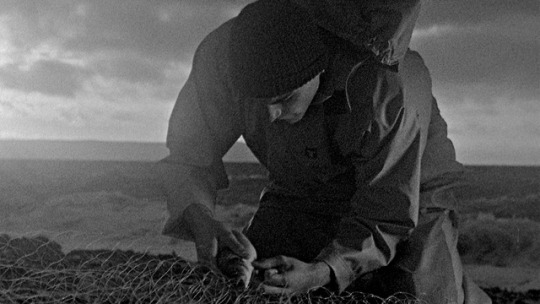
Lucca.
Doug Dillaman runs into gremlins and replicants at the Lucca Film Festival.
When I arrived in a small Tuscan village last month, our movie plans didn’t stretch far beyond the 4:3 television at our apartment, and a possible road trip to Florence to see Avengers: Endgame in its version originale. (Subtitled versions of films are few and far between in Italy generally, and in Tuscany particularly.)
Imagine my delight, then, to discover that just over half an hour from our bucolic doorstep, the walled town of Lucca was hosting a film festival, with guests including actor Rutger Hauer, Gremlins director Joe Dante, filmmakers Mick Garris, Philip Gröning, Paolo Taviani, and French animation director Michel Ocelot.
The Lucca Film Festival brings high-profile filmmakers to its city gates every April, along with a competition featuring up-to-the-minute titles and other special screenings, all for a low cost of 20 euros for the week. Before booking your tickets, do bear in mind that the festival is optimized for locals, which means that without a European language or two up your sleeve it can be a challenge. Hence, we gave a pass to the stacked Rutger Hauer retrospective (including Nighthawks, Eureka, Ladyhawke and Spetters), but we weren’t going to miss the opportunity to see the legend in person, and showed up for a Hauer “masterclass”.
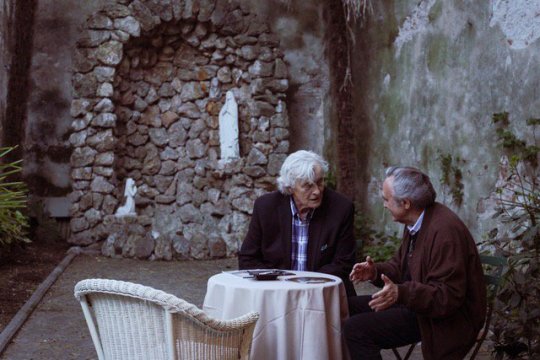
Rutger Hauer and Joe Dante steal a private moment together. / Photo via Lucca Film Festival.
The term was a loose one, as the event that ensued was a barely moderated Q&A, with Hauer tending towards a rambling conversation style, avoiding specificities in most of his answers. When asked what he looks for in a film that he’s considering acting in, for instance: “Something that pulls me in … but I don’t know what it’s called.” On the directors he has worked with, he did manage to reveal: “Paul Verhoeven, who I did my first five features with, made me walk. I was a baby. He taught me how not to act. Ridley [Scott] taught me to dance. And I danced like a motherfucker.”
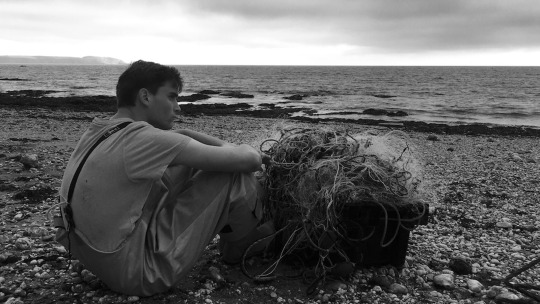
Still from Mark Jenkin’s ‘Bait’ (2019).
More rewarding was the competition lineup, particularly Bait. Englishman Mark Jenkin, who shoots on black and white 16mm film, has produced his first feature following several shorts. Set in an unspecified Cornish fishing village, Bait chronicles the tensions between the “old way of life” and the modern, where locals are edged out by out-of-towners buying investment properties to run as Airbnbs, and fishing boats give up their trade to host stag parties.
It takes time to adjust to Jenkin’s stylistic flourishes, but he’s relentlessly attuned to the emotional truth of his characters, even as the celluloid flares and ripples; call it kitchen-sink unrealism. Shot on a Bolex with the 13,000 feet of film negative hand-processed, Bait has a solid 3.5 on Letterboxd at the time of writing—a good indication that the Lucca Film Festival has its eyes open beyond the usual suspects. (Other competition titles include Eternal Winter, Those Who Work, A Family Submerged, and Nicole Brending’s winning film Dollhouse.)
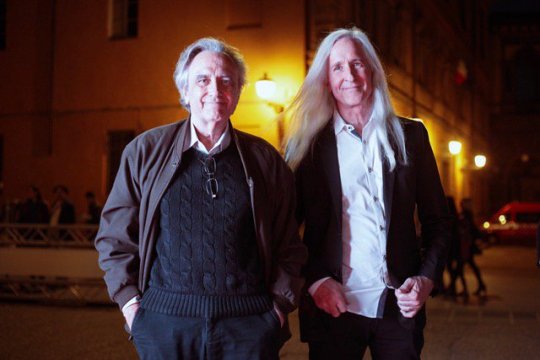
Joe Dante and Mick Garris in Lucca for the city’s 2019 film festival. / Photo via Lucca Film Festival.
My film festival jaunt ended with a highlight: Mick Garris and Joe Dante, in town for the Italian debut of Nightmare Cinema, an anthology horror film which Garris produced and which both of them directed segments for. They proved an excellent double act in their masterclass. Dante is a walking encyclopaedia of film history, needing only the slightest prompt regarding the history of Italian cinema to reel off a string of names that influenced him (including Mario Bava, Antonio Margheriti, and the “three Sergios—Leone, Corbucci, and Sollima”), as well as a trenchant analysis of what killed the Italian film industry in the mid 70s.
Dante is also unafraid to call it as he sees it, labelling the current Italian cinema a shadow of its former self, slamming the original Blair Witch Project an “exercise in emptiness”, and expressing concern about the future of film, noting that “Netflix has ended the Hollywood movie industry” and “the dream of making movies people will see on the big screen the world over is pretty much dead”. He was shocked that an audience member had seen his last full feature film to date, Burying the Ex, a film that he noted was flawed. Someone give this man some money for his Roger Corman biopic The Man with Kaleidoscope Eyes now!
Mick Garris, meanwhile, is the quintessential “glass half-full” character. Noting that filmmakers have to “evolve or die”, he pointed out that TV has gotten really good, and a lot of feature films have gotten really shitty. In spite of Nightmare Cinema’s 12-year gestation period—a film that finally came to exist due to the support of streaming services, incidentally—and having taken his share of knocks, including having his anthology Showtime series Masters of Horror cut short when it was sold to NBC after its second season (becoming Fear Itself), Garris seems fully aware of what a lucky man he is.
This was illustrated best with his story of being hired by Amblin Entertainment to write the first episode of Amazing Stories when he was surviving on food stamps. Both Dante and Garris recognize their Amblin experience as a special time, in part because Steven Spielberg’s supportive presence offered a buffer between them and the studio.
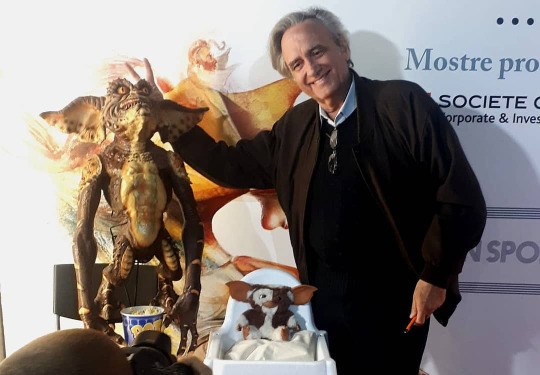
Joe Dante poses with visitors from out of town. / Photo via Lucca Film Festival.
A Joe Dante masterclass without a few Gremlins stories would be a sad thing indeed. He indulged us: the film’s original puppetry was insanely complicated and required 100 people; moreover, after principal photography had wrapped, Dante had to spend an additional month and a half on insert shots of gremlins. He was offered a sequel the weekend it opened, but couldn’t stand looking at those creatures again so soon, and only came back to the project after several failed attempts to develop the sequel by others.
Offered a chance to direct “anything you want” if he made a sequel, Dante drew inspiration from Hellzapoppin’, a fourth-wall-breaking, genre-defying, wildly under-seen comedy. While the puppetry was easier the second time around (25 puppeteers this time), a last-minute release date shift by the studio from May to August—to combat Dick Tracy—wound up hamstringing the film’s success.
If you’re desperate for more, both Dante and Garris have deep Internet presences: Dante runs Trailers from Hell, with commentaries from dozens of filmmakers on various trailers as well as interview podcast The Movies That Made Me, and Garris hosts the Post Mortem Podcast. A few of these stories, in fact, are taken from a special episode of the podcast recorded at the film festival after the Masterclass.
And if you’re looking for some anthology inspiration, Joe Dante gave us four of his favorites; check out his list. Next stop, Cannes!
Reporting by Doug Dillaman.
#lucca film festival#rutger hauer#joe dante#gremlins#mick garris#nightmare cinema#mark jenkin#bait film#letterboxd
1 note
·
View note
Text
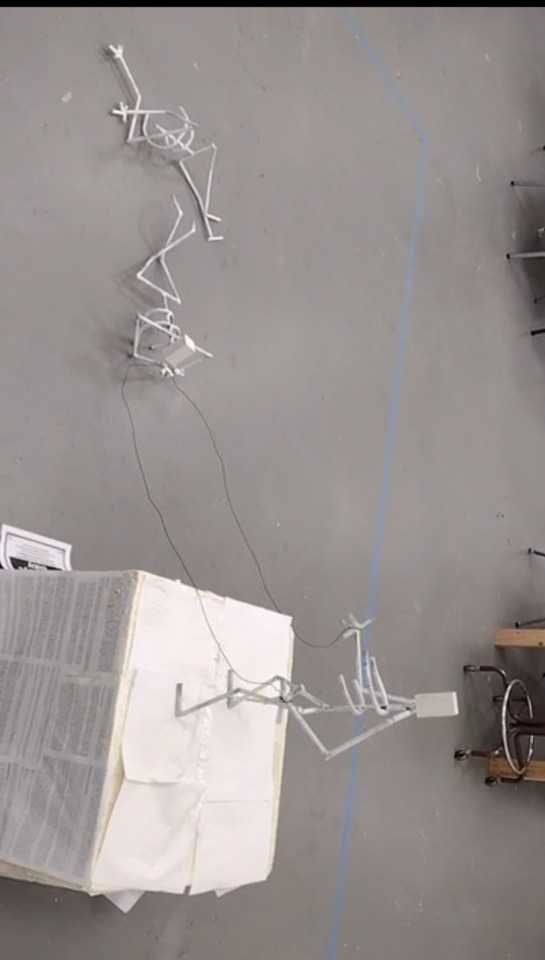
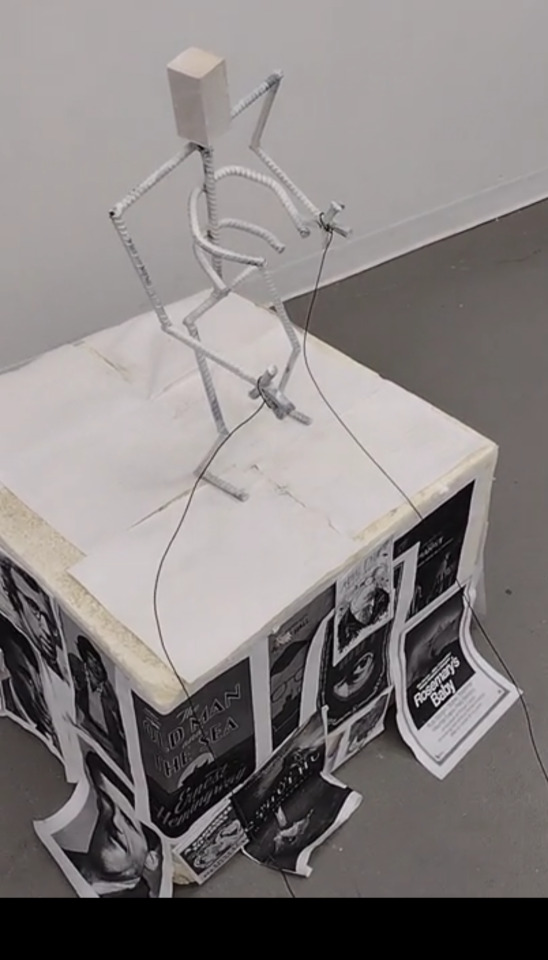
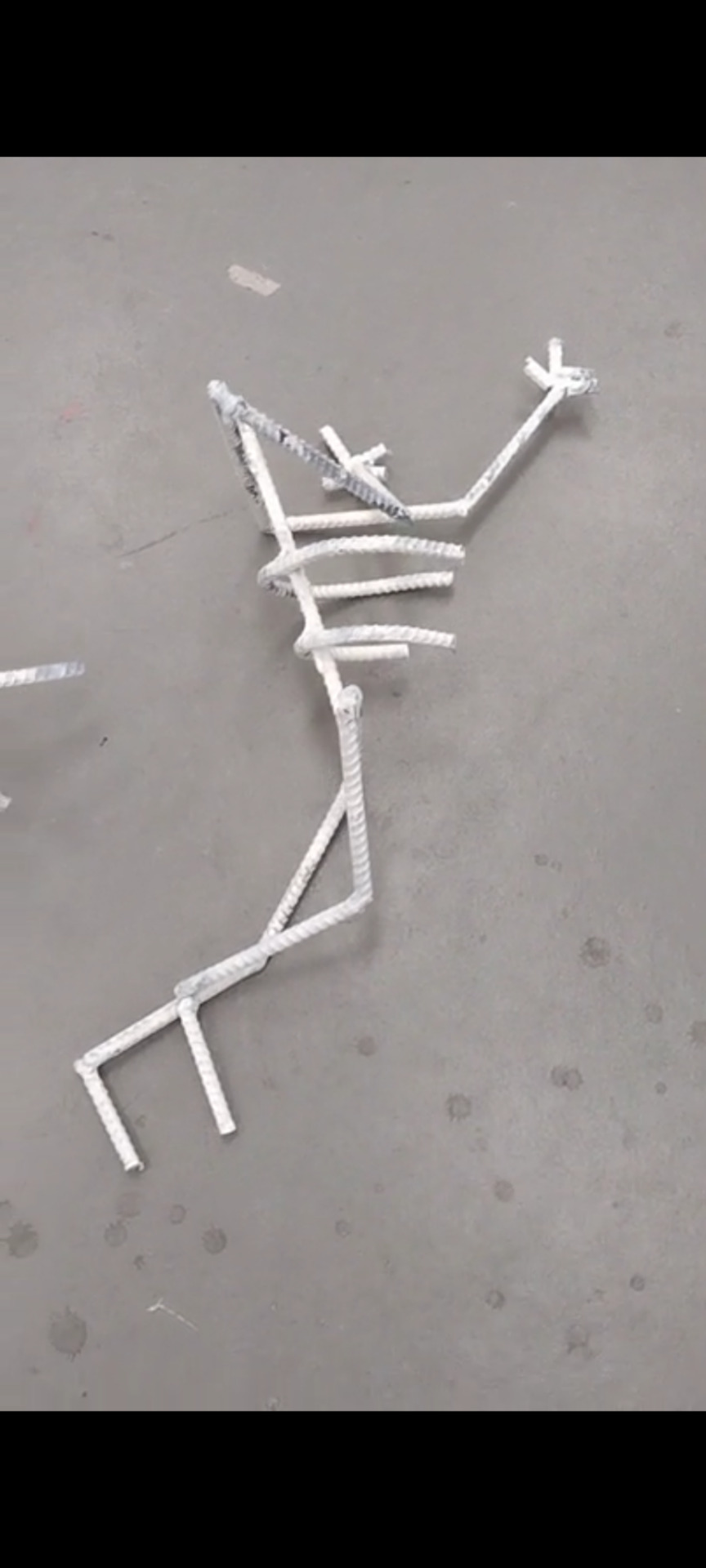
"The Death of the Author"
The idea to this piece came when it was first announced we'd be dealing with welding. I don't have any prior experience with welding material and wanted to work on something that wouldn't be too ambitious yet wouldn't be too simple.
Stick figures came to mind but that still felt too simple and I eventually settled on skeletons.
With the design aspect out of the way, I'll go into the themes. I made this piece to make a commentary on media and media creators, wheter they be authors, actors, directors, etc. The three skeletons each represent a different entity, the skeleton on the soapbox being the creators, the skeleton idolizing the soapbox skeleton being the audience member or general public, and the last headless skeleton, being the reality of the creator, like a human with flaws that can sometimes be too much to handle, the headless skeleton is meant to resemble a corpse of such, generally unpleasant to look at hence why the audience isn't looking at that side of them.
Oh all the pieces I've worked on, I enjoyed the feedback on this the most, especially hearing different interpretations of the piece. (I originally intended for the audience member to be the one pulling the strings of the soapbox skeleton to symbolize idolizing authors to the point where what you're imagining is basically fictional, until a classmate told me they interpreted the strings as the SOAPBOX skeleton being the puppet master and audience being the puppet.) I do like art that has different themes that people can take away from and my goal moving forward is to continue to get more feedback on my art during critiques.
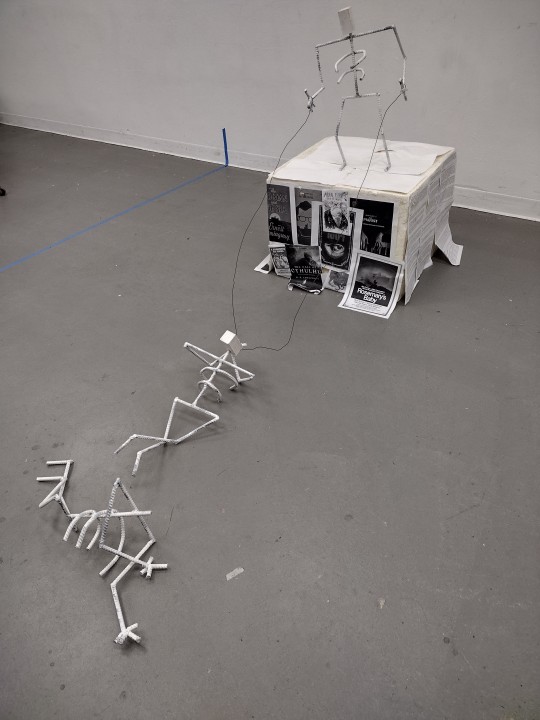
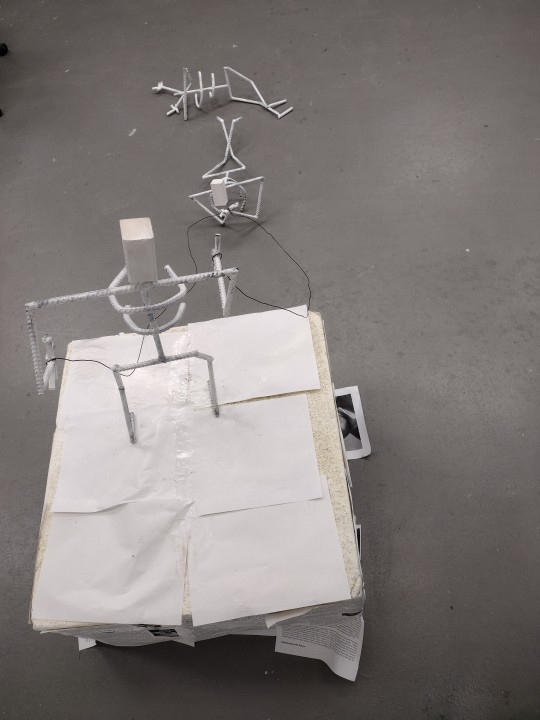
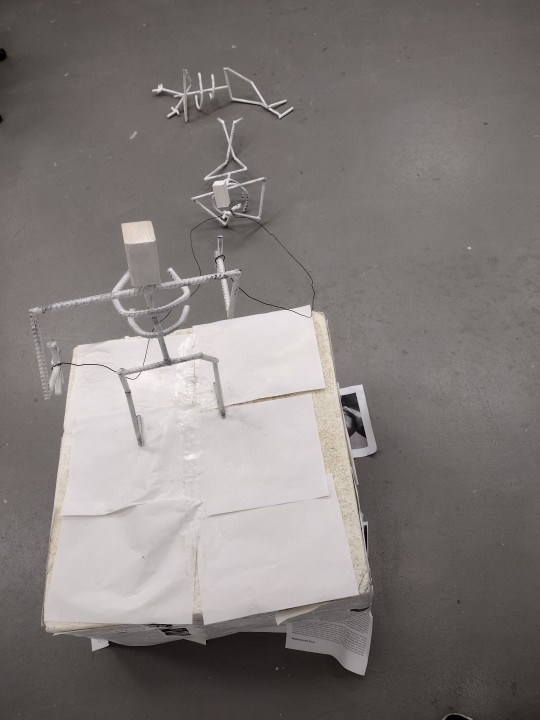
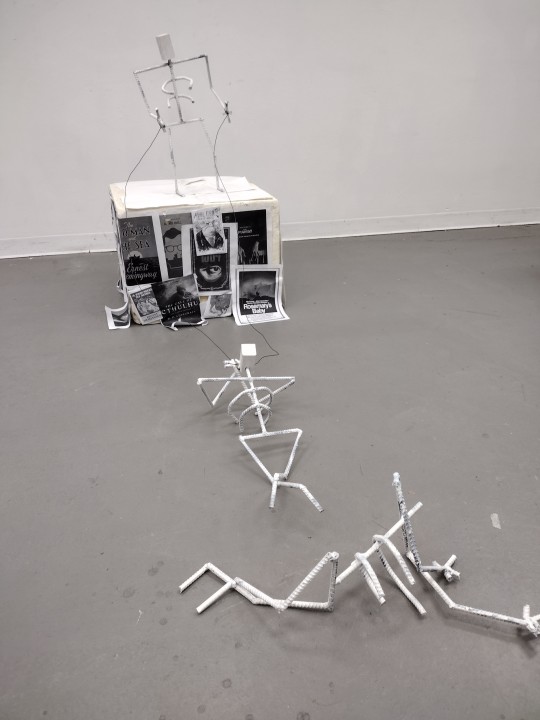
1 note
·
View note
Text
We sit in a round table, a spotlight illuminating the center. A toddler, too young to even know what’s happening, her future on the table. A man bound by dedication, and… devotion (could it be love?), his stability on the table. Me… An adolescent with confusion in her eyes, heart torn apart between two worlds (for what?), my… growth and relationship on the table. I bet a lot of questions, I gave up knowledge, and put it on the table. A woman, tied to her chair, hands held up by strings, her… everything is on the table. An elderly woman, wearing the tragedy and comedy mask on, one of her hands holding the control paddle which I assume is what controls the other woman, the other hand is tied to a bunch of other people at the back. This woman doesn’t have anything on the table. How can that be? Is she a coward to refuse to gamble? There are spectators. Men in black suits, and women in cocktail dresses wear masks to cover their eyes, the same malicious smiles and smug smirks plastered on their lips. Is this some sort of show? There are a handful with scowls imprinted on their faces, teeth grazing lips as if holding back a snarl, eyes narrowed, and jaws clenched. Why are they so angry? At the heart of it all, there’s a revolver, a silent beckoning, “let’s play a game, shall we?”
The first to go is the woman. It’s funny how to puppet gains the will to go. But really, when has the master get on their bare hands and do the dirty work? She takes the gun with no hesitation, as if she has been wanting this – to put an end to everything. She loads the bullet. She spins the cylinder. She points it to her head and pulls the trigger.
She looks up to face me, mouthing the words, ‘I’m sorry.’ I am thrown into more confusion. Why has she said that? What did she do? This is the first time I’ve seen her features: stray grey hairs frame her face, almost too dry lips, cracked cheeks – must be from the dried tears, eyes lined with the color red – she has been crying. Time hasn’t been kind, but so was she. There is her beauty mark in between the hairs of her eyebrows and I knew. It was a normal day in my normal life with my normal family when my mother barged in the room and hugged us tight. She had said some cryptic words that I didn’t know the meaning of. Was she going to die? Where is she going? What happened? But at the thought that she will leave, I let myself cry. Even my sibling, who didn’t know anything, but felt the misery in the air, came to hug us. I didn’t even know the story but I cried. It was a day in my life with my family when we held each other and cried.
Just like waterfalls, the water continues to cascade down, splashing on the rocks with sounds that hurt the ears. In this tiny room, the shouts begin. Shouts of a grown man, insults thrown by the same man, the harsh whispers of the women draped in riches, eyes of jewels, and tongues of snakes – they all feel like a door slammed closed, leaving you in a suffocating room. The woman is silent. She is choking on her sobs. The shouts always fill the house. It makes me think that they are just filling up the space inside. Every other day is like this, and I don’t know what to do anymore. Hidden away in the safety of my own room, I can hear the words coming out of a man’s mouth like bullets. He drops bombs on her like she is a battlefield. What are you fighting for? Why are we going to war? I wonder if she can even feel the eyes on her, or the words directed at her. I want to hold her and tell her that I’m here, she can lean on me when the world seems against her.
The man is the second to go. His eyes rest on me when he pulls the trigger. His eyes are devoid of any emotions, but I want to ask him, why, simply why, why are you doing this, why are you continuing to do this? And yes, I do remember. The story is like an origami crane. It has too many folds and too many sides. But… the first to unfold the story to me is my father.
My room is my safe haven. The white walls paired with bright colors made the whole room come to life. It is filled with my memories, little trinkets to decorate my desks, words painted on the walls, my dreams and my hopes and my ambitions and my achievements all out in the open. There are pieces of me everywhere. There are pieces of everyone in the little things in my room. The little magnet given by a friend, a portrait drawn by my best friend, candies I haven’t eaten because of the words on them, keychains from my previous teachers, a t-shirt as remembrance for either my best or worst years – an origami star. And that day, there was a moment added to the room of mine with every little and big thing that captures a moment in my life. My father went in my room, sat down in the brown chair I’ve sat when I felt I needed to think – maybe this is what we needed: to think. His first words were, “I know that you want to know.” My first words were, “I know.” ‘I’ve put the pieces together, papa’ was left unsaid. And he did tell me everything.
When I was a child, I never believed that money made the world go ‘round. I was taught to be practical, reasonable, logical. I was taught when a mass is trapped in the gravitational field of another body, a set of equations from Johann Kepler tell us that certain stable orbits can result. When this happens, as is the case with our planet, the momentum that the planet had continues until something steels it away. So wasn’t it conservation of angular momentum? But… On that day, at 2 in the afternoon when my curtains were draped, my world suddenly stopped. And on that day, I realized I was wrong. Money made the world go ‘round. Debts mean that your world will be turned upside down – our world is turned upside down. The story almost flew over my head because I chose to hold on to the raw emotions of some of his commentaries.
“I’m trying to fix the broken pieces but she keeps breaking them.” There is a static silence. And silence can only hold so much. The man cries. I don’t know if it’s for relief or for anger.
I look at the people around me. I know the woman and the man’s sides. The people around is another story. Their laughs fill my ears and I can’t help but think that it’s mockery. I stare at a woman, her mouth in a straight line, and her brows furrowed. She is pitying us. I don’t need your sympathy, lady. The lady and her groupie looks at the woman in both pity and anger. They are seeing her as a villain. The women clad in dresses call out her name in reminder. Money, money, money. The men wearing fancy suits places their hands on the man’s shoulder. Some hold their own knives and guns behind their back, a sign of betrayal for the man. The others offer their hand in front of the man, giving him genuine help to get back up to his feet. But just like my father said, when the foundation for a new start is done, someone ends up knocking them over. I don’t know which side I should be on. I stick with holding both of the woman and man’s hands, an unspoken phrase, “I’m here.”
The next is the old woman in the mask. She effortlessly points the revolver to her head, like she has done this so many times that it doesn’t affect her anymore, like she just knows she won’t die. She keeps her face straight forward. Her comedy mask taunts me. Is this fun to you, woman? When she eventually fires the gun, it shoots somebody else in the room. Their cries echo out into the room and that’s when I noticed that the gun isn’t directly pointing on her head – it’s angled ever so slightly that it misses her… and ends up taking someone else’s life instead. Her tragedy mask jeer at me. You of all people shouldn’t mourn over the deceased when you yourself were the reason behind it. I glare at her with hardened eyes, fury dancing like fire. That’s when it all clicked. The mastermind of it all. The master, the controller, the one working behind the scenes, manipulating the game in order to work in her favour, is that old hag.
In the many memories of my father and I talking, the blurred visions in my mind, his eyes holding so much pain and sadness, the mechanical cogs in my brain tossing and turning, trying to make sense of everything, the crack in his voice, my silence as an urge for him to continue – to let it all out, his frustrations, his sorrows, his worries, and oh, his defeat, the bitter defeat that came with it all, there is one person that unraveled the threads in our family tapestry. Maybe… maybe this is part of our fate. Maybe in between the threads that hold the tapestry together, there was a person – a termite, a parasite disentangling the threads.
The story starts with her. We all knew of her money problems long before we have been thrown into the mix. She’s always running around, looking for people, asking them for money. With every large sum of money withdrawn, she is slowly digging her own grave, eventually falling into hell. This witch, suffering in her own form of Tartarus, decided it was too lonely and came back into the mortal realm to find someone to accompany her in her eternal damnation. I know how important it is to seek for guidance, for assistance – it’s healthy to know when to ask for help and to accept that help. But I also know that after we are helped, we have to learn. We have to learn to crawl back up to the surface, to finally breathe the fresh air. Now what did she do? She, with her vice-like grip. She, with her pleading eyes. She, with her begging. She, with her convincing act of the victim. And her. When people, innocent people go into the wrong crowds, falling for the false promises those people made, they can’t help but try it. “It’s going to be successful, I promise!” “We’ll be rich in no time!” “I have already planned this out, so there’s no way it’s going to fail!” Sometimes… the lines between obligation and love blur as one, and you think it’s for love, but what you feel is that you’re indebted to others, that you need to do this thing for them in order to repay them for every good thing they have for you. Her, with the shattering resolve. Her, with the same blood as the witch’s that courses through her veins. Her, with the thought of “I love you and love means sacrificing.” Her… with the feeling of “You have raised me and you have given up heart and soul for me, so I will gladly ruin myself for you.”
This crone in front of me, sitting in a chair of both needles and roses – I don’t care if you’re in pain – do you feel sorry for what you did? I know you are hurting as well, but isn’t this your own doing? I couldn’t care less. You have ruined our lives. When they think their children aren’t listening, the shouting starts. The walls hear them; they tell me what the adults are talking about. The days pass with tension in the air. There are unanswered questions hanging in the air, “what happens next? Is someone going to leave? Will you change? Will you forgive me?” I am made the messenger, delivering commands from opposite sides of the war. You have ruined your daughter’s image. Women circle her like predators; your daughter has her head held up high, and her body shaking. Women are throwing arrows at her heart; your daughter becomes merely a shell of what she used to be. Women are angry for the delayed payments; your daughter’s mind is breaking. You have ruined my father. As a lover, he gives and he gives, and he gives and he gives… until there is nothing left for himself. Mother shoots him in his heart. You are behind her, guiding her hands. His blood, his lifeline spills out. He thinks he has made a fool of himself and yet he himself takes out his heart and offers it. ‘It’s not enough,’ is what you think. You have ruined my mother. The world has turned against her. The people she has helped has crossed her, leaving more headaches for her. On the rare occasion that I stare at my mother, I think, “time moves on.” She looks older. There are eye bags under her eyes, a few more gray hairs – why aren’t there any laugh lines? She’s always tired now, too. I know she just wants rest now. I think, everyone needs it. And I guess, you can’t make emotional labour and mental stress disappear.
The gun slides over the table; it stops right in front of me. Oh, it’s my turn now. There is a new bullet in one of the chambers of the revolver. What does all of this mean to me? Why am I somehow connected to this web of lies? I pull the trigger.
Somehow, with my luck, it was like Pluto passing directly behind Jupiter, in relation to the earth. They all lined up and their combined gravitational force exerts a stronger tidal pull, which would temporarily counteract gravity here on earth. And I’m floating. I feel like I’m floating. These planets aligned themselves like how the loaded chamber aligned with the primer percussion mechanism and the barrel – the weapon is discharged. I imagine the bullet to be a beautiful comet, passing through me, and landing into something else – someone else. It was the toddler. What a beautiful tragedy. I meet the eyes of the people inside this room. They are filled with panic in the audience, madness in the man’s, shame in the woman’s, and is that guilt in the old woman’s? She doesn’t have the right to feel guilty.
I know why the chambers didn’t align with the others. It was because of their actions that led to this – the children dying. I know why the toddler has the future bet on the table. My sister is robbed of the future that I had the privilege to experience– the weekend getaways, the overflowing amount of toys, the endless support to try new things, the unstrained relationship with the other side of the family, the absence of worries, and… the atmosphere of true love between partners in a home.
The adults may not feel the direct attack of the actions, only dragging themselves through the battlefield, but we… the future generation, (is there even a future?), can feel the aftereffects of the nuclear bomb that has been dropped on us. The men and women here might have been atlas holding the world on their shoulders, but we are Andromeda, the chained princess, an offered sacrifice for the peace of everyone else.
I know why the shattered pieces of my heart and mind are on the table. On the other side, I’m walking on a tight rope; my back turned from the past, and walking to the unknown future. I hold a pole in my hands, my father’s side on the right, and my mother’s side on the left. Despite being on opposing sides, the outcome is the same: I fall to my doom. Despite going in the direction of what lies ahead, my head is held down, and my legs are wobbling on the thinning rope of my relationships. I – we – are in a dilemma. It is an unstoppable force – the criticism and judgmental thoughts thrown, the pleas of my father to think of us for the first time, the heavy tension carried in the silence versing an immovable object – the stubbornness of my mother, the unrelenting voice of my grandmother, both of their wills to make amends with the victims of their crime. Mother hasn’t stopped helping. Her golden heart will be the death of her. Father hasn’t stopped covering the holes my mother has left. His commitment is the bane of his existence. Mother tries to stitch my thread back into her side of the family. I have to sit through the occasions with the old hag. Perhaps I can make use of the comedy mask here. I have to be the perfect innocent doll, a smile plastered on my face, voice sickening sweet as if nothing is wrong. Mother looks at me with unspoken instructions, “please be nice.” How do you say “thank you” to the person who turned the fire inside my family into dying embers? How do I stay with the person who turned my little peaceful kingdom into ruins only told in legends and myths?
Blood drips down my head – I’m feeling kind of dizzy. My sister is matching the same expression as I have. This is it, this is the aftermath of the war. This is the consequences of their actions. And there is nothing good that happens in war. Only pain. Only sadness. Only guilt. Only regret. What good has come from this game? I learned the bloody truth. But in this game… we are infinitely waiting for our time when the stars align, and everything ends. This is a losing battle, everyone’s guns are at each other, hands around each other, ready to kill. In my dying breaths, I look around the room once more, the light illuminates the darkness that was once ignorance, and for the first time, I see them fully. My sister, her future taken away from her, sits beside me, covered in her own blood. My father, his devotion still drives him to move on, has his head in his hands, questioning where we had gone wrong. I take his hand and tell him, “It’s okay, I’m still here and I thank you.” My mother, the promise that everything will be okay maybe fades away, and I take her hand in mine, “I still love you,” slips out of my mouth in the softest voice. Grandmother, still in the safety of anonymity, lurks in the shadows, still following us. I place a kiss on the crown of my sister’s forehead. Everything is in fast pace, everything is chaos, and I’m left to wonder, is this how we fall apart?
0 notes
Note
the commentary thing- the scene where hanzo uses his dragons and "splits" and then unintentionally injures mccree, up to dropping off jesse with OW and running off!
Oh, wow, I’ll have to be careful not to reveal too much...
“Shimada, huh? It’s been a long time since we saw any of you here,” the young man said in a low voice. As he spoke, Hanzo looked beyond him to the four dark figures scattered behind, each leveling pistols straight at Hanzo’s chest. “We’d heard you were getting back in the business, but it seems your masters are uninterested in re-establishing the old alliance. I’ll be sure to let my bosses know. For now--” his mouth twisted into a feral grin, a sadistic look that was all the more disturbing to be resting on such a young face. “--we will send a message from the Yoneyama with your carcass.” He stepped back, clearing the way for his comrades. Almost as one, the pistols raised a minute amount as they prepared to fire.
Somewhere in Hanzo’s chest, something tight relaxed, sending pulses of relief through his heart. At last. This badly planned, knee-jerk of a raid had overcome all his paranoia, all his meticulous planning and cautious execution, all his stubborn adherence to duty and decorum. It was over.
He would die.
Hanzo’s been looking to die for a while.
He had felt this way before. Even as he stared down the barrels of his impending doom, his mind flickered back a few months, to the open balcony overlooking the glittering lights of home, when the thin, sharp edge of death had pressed against the pulse of his veins.
He got soooo close--that moment in “Dragons” when he looks annoyed that Genji hasn’t killed him yet speaks to me. Like, he’s finally been defeated--finally--and then this assassin is just standing there?? What, is he going to gloat?? Just do it before--
But then death had been pulled away to be replaced with two brown eyes surrounded by necrotic flesh.
And then Genji revealed himself and the whole world went insane.
His grip tightened around Storm Bow.
“ No. ”
No.
No.
There are at least two voices speaking.
Death had been pressed up against him, reaching out to still the thunderous blasts thudding in his chest--
--no--
--and it was withdrawing, away from the heat and electricity buzzing through his left arm, the tattoo flashing in the dark. No, that was not right--it withdrew from the tiny, traitorous spark, the one that always blazed to life when he--
This Will Be Expanded Upon.
His grip tightened around Storm Bow.
No! There is nothing to shoot with!
Your bow was never anything more than a toy.
A chipped blade, sodden with blood.
Never--never again!
Then think of it as a club. It was a club, at first, centuries ago.
NO--!
Three people talking, now.
It was difficult to say what happened, exactly, when the dragons took hold. Hanzo had never found an adequate explanation. It was even harder now to explain even as his selves slid away from other, as his eyesight doubled and hearing doubled, as the blue light blinded all of his eyes and the twin dragons’ roar thundered in all of his ears.
So! Genji’s Dragonblade is badass, and we know that Hanzo used to use a sword, so it stands to reason that Hanzo’s sword-based ultimate might be similar to Dragonblade. However, being the heir/kumichō of the Shimada-gumi has to be good some for something, so I wanted to think of a way to make it a stronger yet still memorable/unique version of Dragonblade. Since Dragonstrike has two dragons, it made sense to double Dragonblade!
This has since become one of those times when you think of something cool for a story, and later on you suddenly realize: Oh. OohhhhhhHHHH! I CAN DO THIS NOW AND IT MAKES TOTAL SENSE THANK YOU PAST ME. So expect me to expand on this, too, LOOOOOL.
Did they split him in two, he wondered, as his selves dashed to each side, each swinging Storm Bow. One of him aimed for the neck, the other for the head. Two men were cut down, blood splattering from a ruptured jugular ( he had leapt out of the way just in time, eyes wide with fear ) and a skull cracking under a heavy blow ( he had managed to deflect it so that it sideswiped his head, tearing off his ear ).
Since splitting in two would be Highly Useful, even in Hanzo’s newer life as a homeless hobo assassin, there has to be a very good reason why he would never use it again. Until now.
Did they share him somehow, tossing him from one to the other dozens of times a second, too fast for his human mind to process it? He flashed forward too fast to counter, both of him slicing across the eyes ( hadn’t he done the same to him? No, he must not have, he still had his eyes ) before garroting them with the bowstring ( no garrote had been necessary with his blade--it had worked much better, had been much more efficient ). Two more fell, their screams bubbling out ( just as his had ).
I was worried when writing this because Hanzo does use his bow as a sword in “Dragons”, so I wanted to make the experience as strange and foreign as possible so it was the ult that triggered the flashbacks and his breakdown, not using the bow-as-a-sword itself.
The young man was in the middle of stepping back, his expression still transforming from feral to horrified when he both stepped up and swung, the man’s head caught between the double hammers of Storm Bow and Storm Bow. His skull cracked, the skin bulging as it struggled to contain the shards.
Ew.
He fell to the ground like--
--like a puppet with strings cut--
-- just --
-- like --
Oh, Hanzo.
He turned, both pairs of eyes focusing as he both leapt forward. One of him swung and caught the wrist of the cowboy, slamming it against the cinderblock wall the cowboy had stumbled against as he had tried to hurriedly back away, his ridiculous gun falling from his hand. From behind, he smashed Storm Bow against the side of the cowboy’s knee. It gave way with a resounding crack, and the cowboy tumbled to the ground with a strangled cry of pain intermingled with the crunch of glass and plastic.
Hi McCree! What are you doing there?!
The cowboy looked up at one of him, raising his uninjured metal hand, trying to ward him off even as he brought both of Storm Bow up high to sweep down with the killing blow. The cowboy’s eyes were wide, full of fear, brown irises nearly disappeared behind the dilated pupils. He did not want to die, it seemed.
It was a lot of fun writing for Hanzo inhabiting two bodies sharing one consciousness. I love using tenses in ways they shouldn’t.
I also like the idea of McCree being as close to death as Hanzo and having a similar reaction.
He did not want to die, but it was his duty. It was his burden. He had to--
No.
-- you would perform your duty to Overwatch --
Overwatch. The cowboy was part of Overwatch. Genji had pledged his life--Hanzo’s life--to Overwatch. What was he--?
Just a little indication that Hanzo is not the least bit loyal to Overwatch yet. He’s doing this because Genji told him to, no other reason whatsoever, not even to save McCree’s life.
With a jolt like being doused in supercooled water, there was Hanzo, and Hanzo only. He stared down at the cowboy as the world snapped back into ordinary depth, ordinary sound, ordinary experience.
He swayed, he teetered, and fell stiffly onto his side, his instinct to catch himself completely submerged under a swell of searing, agonizing regret and guilt. It was too much. It had not mattered that it was not a sword, it was too much like last time. Ten years was insufficient, it was too close, it was too much, it was--it was--
The cowboy seemed frozen, sprawled on his side, his flesh hand hanging limply from his smashed wrist, his knee twisted unnaturally beneath him. His clothes were disheveled, his red cape bunched up over his shoulders, a bronze colored chest plate splattered with blood. He was staring at Hanzo, his face blank of everything but fear and astonishment.
McCree: What the hell what the hell what the hell what the hell what the hell--
--it was unacceptable to fall apart here, with enemies all around him, with an Overwatch mission in progress.
With the cowboy watching.
Yeah, why was he just watching, anyway?!
With a supreme effort of will, Hanzo forced the regret, the guilt, the paralyzing fear and loathing, into a cold and hard lump in his chest.
It would not stay that way, but it would for long enough.
He had to do a similar thing ten years ago.
Jerkily, robotically, his face falling into a neutral, almost slack expression, he gathered himself to his feet. The cowboy scooted back, a pained grunt escaping him as he jostled his knee and wrist. Something clinked underneath him as he moved. Hanzo glanced down and saw the the pieces of the cowboy’s smashed comm scattered beneath him, crushed as he had smashed the cowboy’s leg out from under him.
He tapped at his earpiece.
“This is Shimada. Agent McCree is injured,” he said, his voice strangely void. The cowboy narrowed his eyes.
McCree: [TEXT REDACTED]
“This is the medic,” said a voice. Somewhere, deep and far away, a clouded portion of Hanzo’s mind was conscious enough to register a tiny beat of annoyance at yet another unknown person. “What are his injuries?”
“Broken wrist and shattered knee. What is your position?”
“I am en-route.”
“No-go, Mercy. Is your position secure, Shimada?” The low, gruff voice.
Hanzo glanced over his shoulder to the entrance of the alley. “No. There are currently no enemies, but I do not know for how long.”
Yeah, why are there no enemies?!
“Can you get McCree to the warehouse?”
“I believe so.”
“We have the chips. Mercy, meet McCree and Shimada at the warehouse. Tracer, head back to the transport and pick up everyone here. Understood?”
“Right-o! See you in a tic!” chirped the bright voice.
“Understood,” said the medic.
“Acknowledged,” said Hanzo. He took a step toward the cowboy.
He flinched and tried to reel back. “Stay the fuck away from me!” he growled.
Hanzo took two quick steps and slapped him across the face. “I must help you while I still can,” he said quietly, voice still abnormally void, to the cowboy’s shocked face. He grabbed the cowboy’s uninjured metal arm, the titanium cold against his flushed, fiery skin, and pulled him up. The cowboy yelped as his injured knee twisted. Hanzo ignored it as he hefted the tall and wide body onto his shoulder in a fireman’s carry. He squatted to grab Storm Bow off the ground and again to collect the cowboy’s heavy revolver and broke into a slow jog down the alley towards the warehouse.
I really wanted Hanzo to slap McCree at least once. I also wanted Hanzo to carry McCree because he does not have chicken legs, goddamnit!!
He focused on the burn in his thighs and back, on his wild heartbeat and deep uneven breaths as he carried the heavy load. The cold lump in his chest was threatening to burst at any moment.
The high blue walls of the warehouse soon came into view. Smoke billowed out of several broken windows and the wide-open door of the fire escape on the third floor. Hanzo rounded the building, searching for the cowboy’s teammates.
He found them gathered by one of the side entrances. If he was anywhere close to being in his right mind, he might have hesitated at the veritable mountain of grey steel shaped into a vaguely human form, but as it was, with his mind running only the most basic and necessary functions as it struggled to delay the inevitable, he merely trotted up to it. Beside it were three more people, a man who would have been intimidating if he were not standing next to the mountain, face obscured with a visor that glowed a dull red in the city night. Another was a man who was should have been diminutive, barely standing above Hanzo’s waist yet was bulky with corded muscle. Hanzo distantly noted the enormous claw that served as an arm before focusing on the last person.
Hanzo Meets Overwatch Under The Best Possible Circumstances
aka Hanzo just can’t switch off the observational skills
She would have looked average, just slightly shorter than him with blonde hair pulled into a high ponytail, but she was dressed in odd formfitting white armor that branched into white and gold wings from her back, all surmounting with a gold halo that circled her head. She held a white and black, subtly technological staff in one hand. She rushed forward when she caught sight of him.
“You are the medic?” Hanzo asked, slowing to a stop.
She looked him in the eye with a piercing, searching gaze that lasted far too long. He would have tensed, would have stepped back to put distance between them, but he was too busy holding back the tide of his own mind. She nodded at last. “Yes. Dr. Angela Ziegler, callsign Mercy.”
Angela: ...three-pointed eyebrows...
This was an accident. The eyebrows thing didn’t occur to me until I was writing Chapter 9, and it was lucky that she had stared at him here.
Now I get irrationally angry whenever I see fanart of Hanzo without his three-pointed eyebrows.
“Shimada Hanzo,” he replied without feeling. He squatted, and she helped him lay the cowboy on the ground. The cowboy’s eyes were clamped shut, his face blanched and pale.
McCree: I don’t know what’s happening here, but I know he’s jostling my knee on purpose--not that I don’t deserve since [TEXT REDACTED].
She began inspecting his wrist. “What happened?”
The cold lump in his chest pulsed. Hanzo stood with a jerk.
The medic looked up at him, eyes narrowed. “What--?”
“The cowboy will explain. I must go.” Hanzo said as he dropped the cowboy’s gun to the ground and turned away.
McCree: How, though?
“Hold up, Shimada.” The visored man stepped forward. “More of the Yoneyama--”
“I am not so easy a target,” interrupted Hanzo with no heat. “Farewell.”
Whoo, he says that in the game!! And in Chapter 9! Because he wants a catchphrase, even if he doesn’t know it!
With a running start, he climbed straight up the side of neighboring building. Springing onto the roof, he sprinted across the roof and leapt onto the next, and the next, and the next. He merely took whichever route presented itself, reaching at random to the nearest roof or ledge, dropping to street level only to cross to the next block of buildings, focused on nothing more than his breathing, his burning legs, and the next handhold.
He absently noted the industrial buildings abruptly stop, the warehouses and factories sharply transitioning into commercial buildings and apartments, neon and hard light storefronts and marquees slowly brightening the streets. Bordering both districts was a small park, edged with a low hedge that was densely packed with leaves and thick branches. He dropped to street level, digging out his earpiece as he went. He gently clicked it into its port on his comm as he unclipped it from his belt and shoved it into the nearest bush, making sure to bury it as far within as possible before turning away and running silently down the deserted street, bloodshot and increasingly twitching eyes searching the marquees and storefronts.
He soon found one that advertised the supplies necessary to survive the night.
The vending machine had plenty to offer, but he immediately focused on the pink, blue, and white liter cartons of plum wine and sake lining the bottom shelf. With trembling, clumsy fingers, he withdrew a pouch full of rolled up coins from a hidden pocket, a sight as outdated as his kyudo-giand bow. The coins dropped into the slot with loud plinking sounds far out of proportion with their size, and he impatiently watched each carton fall to the bottom of the machine before inserting more. It felt like an eternity before it seemed he had enough for his purposes. He stuffed all the cartons into a plastic bag that he dug out of a nearby waste receptacle and he was back on the rooftops.
In the first published version of the text, I had him break into a liquor store and steal a bunch of vodka--but he very consideringly left money by the register. Then @cantodelcolibri happened to let me know about ALCOHOLIC VENDING MACHINES AND MY HEAD EXPLODED BECAUSE I’M FROM UTAH AND ALCOHOLIC VENDING MACHINES ARE AN EXCEPTIONALLY FOREIGN IDEA HERE OK
All the while, the cold lump in his chest was pulsating, cracking, leaking memory and despair into the pit of his stomach, straining his willpower and his strength. He had to find somewhere soon, somewhere hidden, somewhere high, somewhere where no one would see.
He did something similar ten years ago.
An office building, ten or twelve stories high, pre-Crisis construction with old-style solar panels arranged in neat rows on its roof, waiting to shield him from sight, no neighbors of comparable size. Perfect.
He scrambled up the wall, movements increasingly hesitant and unsure, his chest tightening from the effort of containing himself for just a little longer, just a little longer, just long enough to--
--crawl under the raised solar panels--
--hear Storm Bow and his destroyed quiver clatter to the ground--
--collapse--
--rip open the first liter carton--
--and drink and drink and drink and drink and drink --
--and hold on just a little longer, just a little longer, until the blackout took him, and whatever the cold lump did to him when it finally burst could be safely hidden in the dark.
The last time it took a lot longer than three days to regain consciousness again.
Thank you for the message!! I hope you enjoyed this, too!!
29 notes
·
View notes
Text
* . . . please like this post to help me test paige !!!
7 notes
·
View notes
Text
green gloves, oneshot
fandom: black lagoon
summary: She misses having a drinking partner, which really, really sucks. / RockRevy, the melancholy nostalgia of humid night air that makes you think too much. Post-series.
notes: i've literally put so much thought into revy's character throughout the series i love her so much. this is set several years after the end of the series (more than five years at least), so i tried to write the characters like they were a little older. or at least, how i assume they'd be? title is a song by the national, the atmosphere of that song encompasses that whole bittersweet nostalgic weird kind of feeling 10/10 vibes would recommend. but who knows maybe i'm the only one that gets that kind of feeling from humid summer nights. (disclaimed.)
green gloves
;;
falling out of touch with all
my friends are somewhere getting wasted
hope they’re staying glued together
i have arms for them
;;
She hears it every now and then, on the occasion that she actually goes out for a drink alone. It's the attempted whispers and not-so hushed tones of the Yellow Flag's usual types from behind their glasses.
Is that her?
The woman from Lagoon?
Revy flexes her fingers idly, rolls an unlit cigarette across the bar top. If she keeps her back to the voices, maybe she'll be less inclined to shoot them.
Not that she really would. Not now. At least not over so little; it would take a hell of a lot more than the drunken musing of retired mafia goons and hookers to make her waste the bullets.
But still. The commentary gets old.
"It is her—Revy Two Hands."
"You can see her guns."
"Whatever happened to her?"
She snorts audibly and knocks back a shot of Bacardi. "Good fucking question."
"That can't be her," one of the voices chimes in, and Revy can hear the cheap red lipstick in her shrill tone. "She doesn't have that guy with her."
The comment makes her bristle instantly. Her fingers twitch instinctively for the trigger. Even if the years have mellowed her temper enough to know better than to shoot up the Yellow Flag for less—which she has—, there can always be room for exceptions.
"Right, that businessman—."
"The Japanese guy—,"
"The cute one."
That's the it, the point where her glass clinks back on the bar top and Bao gives her a warning glare, his mouth loaded with the threats of violence he'll impose on her if she shoots anymore holes in the joint.
Only she doesn't reach for her Berettas. She laughs mirthlessly, for the spectators to hear, then slaps a couple of dollar bills on the counter and takes the rest of the bottle with her. It's not like Bao can do anything besides bitch at her for it, but then what else would be new?
She strides past the group, who all silence hastily and cower and stare at her with gaping eyes. One hand, the one that's not holding the bottle, rests imposingly on the grip of a gun, a silent warning just in case any of them have any more pointless words to throw in her direction while she leaves alone.
She misses having a drinking partner.
Which really, really sucks.
;;
Outside the bar is less appealing than inside. The night air is thick and humid; the kind that wraps around her bones and is somehow as chilled as it is suffocating. It envelops her entire body and makes her feel too heavy to move. She lights a cigarette and trudges through it anyhow.
It's late and she's tired, which she thinks is fucking hilarious.
She remembers a few years back, the night would've barely begun. Right now, she'd probably be getting hammered and playing cards at the church with Eda until one would pull a gun on the other, and in the morning they'd wake up on the altar, the sanctuary smelling of spilled rum and gunpowder, laugh it off, and plan to do it all again next week.
Or, she thinks bitterly, she would've been somewhere else, with someone else.
The cute one.
The girl's words echo in her mind, swirling around with the alcohol. She can just picture Rock's face if he'd been there—a blush blooming on his cheeks as he tries to play it off and on a good night, she berates him for it or on a bad night, she draws a gun on the poor girl.
On second thought, she doesn't want to think about it.
Instead, she wanders the streets of Roanapur, drinking Bacardi straight from the bottle, daring anyone who crosses her path to say anything.
It's been like this a lot lately.
The Lagoon crew's been out of the game for a while. First it was no new jobs, then it was new players who came along with new skills, and suddenly the four of them were obsolete. Or she was, at least.
Because Dutch had been working in Roanapur for years before Lagoon, and Benny has his computers, they're both valuable assets to anyone looking for skill.
Revy was only ever a gun (and there's no excuse for a fool with a gun).
Dutch still checks on her every few days, mostly out of habit. He makes sure she's not drinking more than eating. Which she is, of course, but one day she'll appreciate him for trying, maybe.
Secretly, Revy would kind of like to get old. Dutch reminds her of that sometimes, just being there with his wise words and taciturn demeanor. Not that Dutch is old. Just old-er. Just, probably, older than she'll ever be.
And yeah, it's kind of sad because Lagoon was the closest thing she's ever had to a family. A good one, at least. Marginally good.
The roaring drone of water falling pulls her out of her goddamn head for a second. She finds herself beside the fountain at the plaza, the one with the statue of a half-clothed woman posing valiantly at the top. Or she would be valiant if she weren't smeared with seagull shit, dripping down the sides of her head in white tracks.
Next to the noose out front, it's a damn good metaphor for the city.
Mostly, Dutch asks about Rock.
Good, she thinks. Great; she's thinking about Rock again.
And she thinks, why should she care how he's doing? Rock took his puppet master hero complex straight to the top and is pulling so many strings she's lost track. She's done her time worrying over him, keeping his evident death wish from ever actually claiming his life, never expecting anything in return for years only for him to forget that he would've died a hundred times already if it weren't for her.
Rock doesn't need her anymore.
Fuck Rock, she spits at Dutch through a mouthful of bitterness.
She could've left him in Japan—she should've. Let him life a nice quiet life in the suburbs with a pretty white-collar rich wife named Sakura and have white-collar rich kids that complain and cry all the time. Then maybe one day in fifty years, he can come back to hell and leave a marigold on her grave and see if she cares—
And then her bare knee is crashing into the stone edge of the fountain and, fuck, that hurts.
She glares down at it. The skin is scraped raw, already turning purple at the edges and red in the middle. A teardrop bead of blood oozes down over the white scar on her shin, from the sword, from Japan, from a lifetime ago.
Good, she thinks. Great.
She wishes he were here.
;;
Revy doesn't know what it is—the humid air, the Bacardi, or the stinging ache in her knee—that puts her on autopilot, the lights of the city blurring in a haze until she's shoving open the door of Rock's permanent motel room and stumbling over the threshold.
Why is she doing this why is she bothering what's the fucking point—
"When are you gonna lock your fucking door, Rock?" she sighs. There is no bite to her words.
Light from the hallway cuts across the floor between her heavy boots. The thin beam traces a line across the floor and the paper and empty beer cans. It climbs up the side of the bed. And it ends, slicing Rock's face in two.
One brown eye, the one in the light, opens sluggishly.
The door closes and the beam is gone.
"Revy?"
Rock is sprawled out on his stomach on the bed in the middle of the room.
She gives no response because he doesn't deserve one and also because she wouldn't have one anyway. Instead, the sound that fills the room is her heavy boots clunking on the floor where she drops them by the door. Her holster is next, shrugged off of her tired shoulders. Her berettas scrape along the floor before coming to rest by the edge of the bed.
Rock's eyes are on her, she can tell, level with her thighs and the bruise on her knee.
The now empty bottle hits the floor and then she is flopping down on top of him.
The bed creaks.
Rock gives a soft grunt on impact but doesn't complain. Good. She wouldn't care. Instead, he mumbles, "hi", voice muffled in between the pillow and his partner. Ex-partner? Ex-parter-ex-best-friend-ex-something.
There's another lag before a response, the sound of their mismatched breathing filling the room instead. And then-"Fuck you, Rock."
Then: "Hi."
She thinks it's funny, vaguely, how little the room has changed. The Hawaiian shirt she bought him all those years ago hanging on the wall still (why would he keep it, why is it still fucking here), in the midst of his hastily scribbled notes in his cramped business man writing.
Her cheek is sweating where it's pressed into the crook of his neck and Rock probably can't breathe and somehow it's all more comfortable this way.
The things she wants to say sting the back of her throat worse than rum ever could, but she can't even get the words right in her head, and god, it's late, and finally all that comes out is-
"You should've left."
Rock sighs. "Revy..."
Because she's said it so many times. It's something safe, something easy, something that comes spilling out of her mouth with no effort every time she has a feeling she doesn't want to have, doesn't know how to deal with.
"You never shoulda come here, Rock."
The words are weighted down with exhaustion.
How many years has it been?
Rock gives a kind of quiet laugh and replies, "You keep saying that, but I'm still here."
(I'm right here where I'm sitting, Revy-).
Rock says, "I'm not anywhere else."
He squirms under her, and she gets the message, and shifts her weight onto her forearms and knees enough to let him roll onto his back before collapsing back down again. His chin rests on the top of her head and she can feel his pulse on her cheek and it's familiar.
It's an unwelcome thought that goes involuntarily through her mind, of all the times the two of them have been in this same position, which isn't that many, but enough to make the feeling of his hand on her back a comforting one. The time she wants to think of the least, the last night in Japan, in a shitty motel, her skewered leg bleeding on the sheets.
"You wouldn't fucking need a gun there," she thinks, out loud, without realizing.
"Maybe not," Rock sighs again in that tired, tired voice. "But I need one here."
Her gloved hand tightens in the fabric at the collar of his shirt.
Maybe she's kind of bitter, maybe he should act like he still needs her if apparently they both know he does, maybe he should come back down from the top, maybe she should tell him this.
Rock says, "I'm still a bullet, aren't I?"
The things she's wanted to say die in her throat.
#black lagoon#rock x revy#fanfiction#revy x rock#yes guys i'm still writing fan fiction i know i know i know#but im actually so happy with this#and i have so man feeeeelings about black lagoon STILL#and this is a good compilation of a lot of them#and finally getting some of my head canons about revy's inner thoughts out there#otp: the one that let me in#my writing
52 notes
·
View notes
Photo
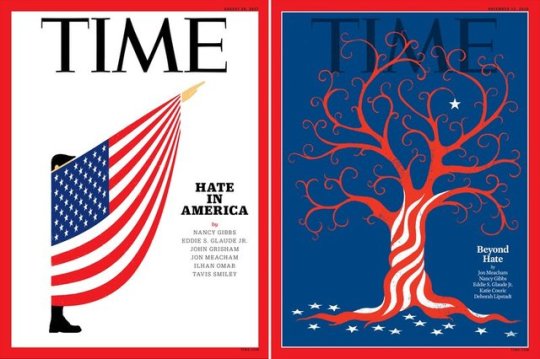
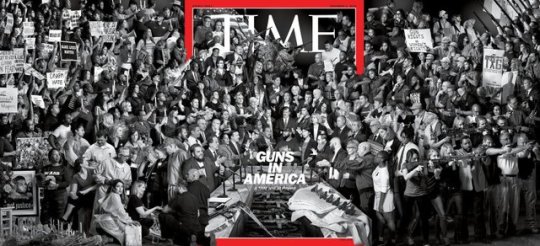
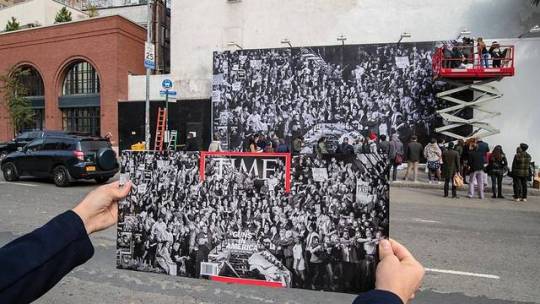
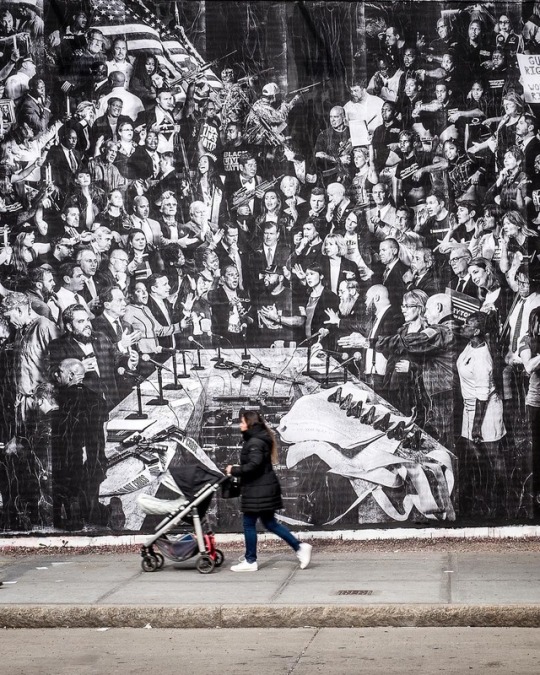
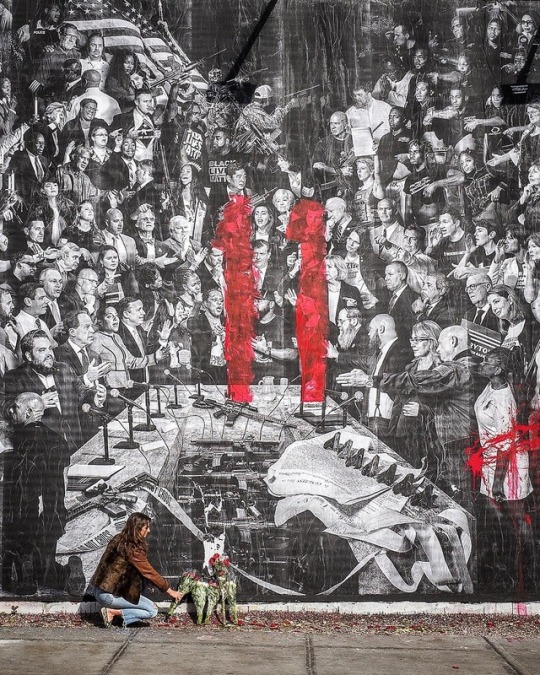
The Only Way to Fight Hate
Nancy Gibbs Nov. 1, 2018
A TIME special report
Hate, among all our base instincts, is the most distinctly human. In animals, violence and venom are tools of survival; in humans, of supremacy. Small, scared people hate, self-hating people hate, bullied and betrayed people hate, as though hate will make them large and safe and strong. The twisted writings of this latest class of attackers suggest they felt called to their hatreds as a duty. Robert Bowers allegedly blamed Jews for their outreach to refugees and vowed to repel “invaders” moving north through Central America as he set off to the synagogue: “I can’t sit by and watch my people get slaughtered,” an account matching his name posted, like a martyr dispatched to a massacre. Accused mail bomber Cesar Sayoc stalked George Soros, the billionaire Holocaust survivor and Democratic donor, who conspiracy theorists claimed was funding that invasion–never mind that those armed invaders were nearly a thousand miles away and the main thing in their arms was their children. “Whites don’t kill whites,” a witness quoted Gregory Bush as saying; he was arrested in the murders of two black shoppers at a Kentucky grocery store, allegedly having failed to get into a predominantly black church nearby.
We’re having a master class on hate because we’ve no choice; it has moved from the part of our character we work hardest to suppress to the part we can least afford to ignore. Hate slipped its bonds and runs loose, through our politics, platforms, press, private encounters. And the further it travels, the stronger it grows. People unaccustomed to despising anyone, ever, find themselves so frightened or appalled by what they see across the divide that they are prepared to fight it hand to hand. Calls for civility are scorned as weak, a form of unilateral disarmament. President Trump calls for unity in the same breath that he undermines it, demonizing adversaries, minimizing threats, trivializing trauma. He didn’t consider canceling a political rally out of respect for the slain; he considered it, he said, because he was having a bad hair day.
So much attention is paid to the President’s lies that we can miss his radical honesty. He didn’t see any need to call the former Presidents in the wake of assassination attempts; “I think we’ll probably pass,” he said. That mail-bomb spree was a shame, he argued, because it slowed Republicans’ midterm momentum. His tweets of sympathy for the victims of the synagogue shooting were followed by color commentary on the World Series. The solution to such shootings, he suggested, was to bring back the death penalty: How better to fight violence than with more violence? And if there is a rising of dark and dangerous forces in the land, he believes, it means that “the Fake News Media, the true Enemy of the People, must stop the open & obvious hostility & report the news accurately & fairly.”
Likewise, the evidence of his utter lack of empathy belies his great gift and political advantage–this ability he has to sense our darkest instincts and call to them, coax them out of hiding, when we’d much prefer not to see them at all. Of all the norms he violates, this is among the most disturbing: that Americans will always seek leaders who lift us up and bring us together rather than drag us down and tear us apart. Make America Great Again has been a brilliant, aspirational slogan for the resentful and aggrieved; but that road to greatness turns out to run through the smoking wreckage of institutions, values and national honor. Gone is the joy that comes from political battle that is not a fight to the death. When politics becomes blood sport, people actually die.
Here then is the challenge: our normal responses aren’t working. The spread of conspiracy theories as the “real truth” at least presumes that truth matters, even as the theories undermine it. Social networks designed to connect friends turn out to be expertly designed to create enemies. Fact-checking makes no difference; tribes trump truth. When reporters try to hold the President accountable for inflaming the hatred, he attacks them for bias, for fueling division. When partisans on the left call for fighting fire with fire, they validate the tactics that debase our discourse.
Caught in the cross fire is a public not so much enraged as exhausted, at a loss to explain or escape the ugly, intellectually barren fever swamps that now pass for our public square. Conspiracy theories flourish as a substitute for the hard work of actual knowledge. They grant those who embrace them a shortcut to superiority: average people believe what they hear on the evening news or read in the papers, but you are smarter, you know better, you see the patterns and plots behind these events, the “globalists” pulling the strings, the “deep state” undermining your mission. You can’t be fooled, you won’t be puppets, you know better, you know the truth.
So what to do? The most eloquent politicians who warn of the toll this is taking are mainly the ones departing the scene. Where will we find moral leaders in an age of abdication, when “elites” of all kinds are suspect, whether teachers or preachers or scientists or scholars?
If our past is a guide and comfort, it comes from where it always comes from. Look left, look right, not up or down. Leadership lies with the spirit of the Tree of Life synagogue, where victims included the dentist who offered his services at the free clinic, the brothers who had “not an ounce of hate in them,” as their rabbi said at their funeral, the couple married there more than 60 years ago, all mourned by the thousands who came out to stand vigil in silent solidarity. It lies with the postal workers going about their work even as more mail bombs turned up, and the neighbors in Kentucky who, in the wake of the grocery-store shootings, held a community meeting to discuss race and violence.
If the opposite of love isn’t hate but indifference, then the antidote to hate is engagement. It comes from the people who spent the weekend knocking on doors and staffing phone banks to get out the vote on Election Day. From the enterprise of technologists looking for ways to drain some of the toxins from our information streams. From employees who are letting their bosses know what kind of humane, sustainable culture they expect in one of the richest countries on earth. From church groups and civic clubs and marchers raising money for clothing drives or breast-cancer research or tree plantings. From teachers staying after school to tutor and coaches teaching their players about the difference between an opponent and an enemy, so they can take that wisdom with them into a public space that feels less like a sport than a war. Leadership will come from uncountable individual decisions to model kindness, to fight alienation, to get offline and into the streets or the classroom or the sanctuary and help someone in trouble.
This much is clear. Whatever happens on Tuesday, no one is coming to save us. We’ll have to do this ourselves.
Gibbs, a former editor-in-chief of TIME, is the Edward R. Murrow visiting professor at Harvard Kennedy School of Government
This appears in the November 12, 2018 issue of TIME.
http://time.com/magazine/us/5441415/november-12th-2018-vol-192-no-20-u-s/
0 notes
Text
FEBRUARY 3: Gertrude Stein (1874-1946)
As I’m sure many of us have found out, there are a few women in the great, wide history of wlw that have become so well-known and intrinsically associated with gayness that you could make a game out of simply name-dropping them in a crowded room to see how many among you are One Of Your Kind™. Gertrude Stein, owner of one of the most famous Parisian salons of the 20th century, puppet master of some of the century’s greatest artists, and who turns 143 years old today, is one of those names.
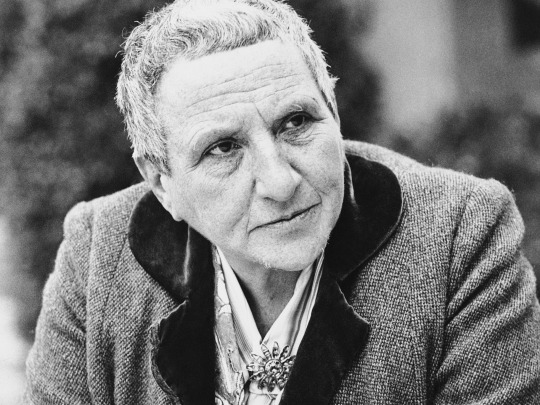
Although she was born in Allegheny, Pennsylvania, Gertrude would soon become a globetrotter when her upper-class Jewish family packed up and moved to Vienna, and then Paris, until finally settling down in the city of Oakland, all in just her first four years of life. After her mother died in 1888 and her father just three years after, Gertrude’s oldest brother Michael shipped her off to Baltimore to live with her uncle. It was there where Gertrude encountered a glimpse into her future in the form of Claribel and Etta Cone, two sisters who lived together and held weekly “salon meetings” in their apartment. Every Saturday night, Gertrude would gather with the sisters and their friends to discuss politics and art. Later on in life, Gertrude would remark that seeing Claribel and Etta’s domesticity as two women who were able to uphold a household together had fascinated her and she came to understand it as something she wanted for her own life.
As an adult, Gertrude bounced around to different colleges. She studied psychology and writing at Radcliffe College and then pursued a medical degree at John Hopkins University, although she eventually dropped out. One of the driving factors behind Gertrude leaving John Hopkins (besides her disillusionment with the patriarchal culture of academia) was her involvement in a classically tragic lesbian love triangle. Gertrude became infatuated with a fellow student, Mary Bookstaver, and later wrote of her crush as an “erotic awakening,” but she was hardcore rejected when Mary revealed to her that she was involved in a longtime relationship with her girlfriend Mabel Haynes. Heartbroken, Gertrude left school and moved to Paris with her brother Leo, ready to start a new life for herself.
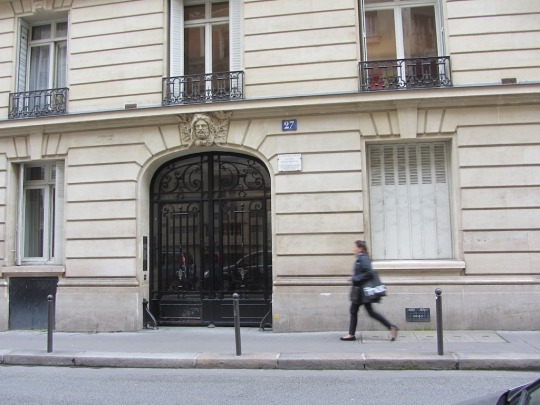
The exterior of 27 rue de Fleurus as it stands today.
It is in Paris where the mythical stories of Gertrude Stein’s life begin to unfold. She and Leo moved into the now famous 27 rue de Fleurus, where they began to host weekly salon meetings and amass an impressive art collection. Throughout the years, the Stein siblings would eventually depart, allowing for Gertrude to evolve the salon into her own creation. Pablo Picasso, Henri Matisse, Ernest Hemingway, and F. Scott Fitzgerald are simply a few of the defining artistic minds of the 20th century that Gertrude came to form close and personal relationships with through her salon meetings. Books upon books have been written about the tangled webs Gertrude weaved among each of these men – A Moveable Feast by Hemingway being one of the most iconic. As a woman who pulled the strings of so many male artists’ lives and creations, it would not take much for one to want to categorize Gertrude as a feminist hero; however, Gertrude’s approach to politics was contradictory in the extreme. In A Moveable Feast, Hemingway accounts a conversation he had with Gertrude on the topic of homosexuality where she is recorded as saying:
“The main thing is that the act homosexuals commit is ugly and repugnant and afterwards they’re disgusted with themselves. They drink and take drugs, to palliate this, but they are disgusted with the act and they are always changing partners and cannot be really happy…. In women it is the opposite. They do nothing that they are disgusted by and nothing that is repulsive and afterwards they are happy and they can lead happy lives together.”
Following World War II, Gertrude would also form ties with Nazi collaborators Bernard Faÿ and Marshall Pétain.
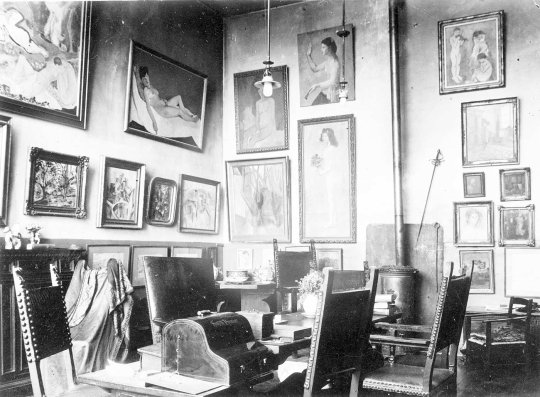
The art collection of 27 rue de Fleurus as it stood during Gertrude’s lifetime.
Now for Alice B. Toklas: Gertrude’s life partner and the catalyst of her literary career. The two first met on September 8, 1907 on Alice’s first day in Paris. Gertrude’s brother Michael introduced them and Gertrude later wrote on her first impression of Alice:
“She was a golden brown presence, burned by the Tuscan sun and with a golden glint in her warm brown hair. She was dressed in a warm brown corduroy suit. She wore a large round coral brooch and when she talked, very little, or laughed, a good deal, I thought her voice came from this brooch. It was unlike anyone else's voice—deep, full, velvety, like a great contralto's, like two voices.”
And the rest is history. Alice and Gertrude were together until Gertrude’s death in 1946. Although Gertrude penned several seminal classics of lesbian literature (Q.E.D., one of the first known coming out narratives, and Tender Buttons, a commentary on lesbian sexuality), it was the book The Autobiography of Alice B. Toklas – written by Gertrude in the voice of her partner – that launched Gertrude from a behind-the-scenes role in the literary world to center stage in 1933.
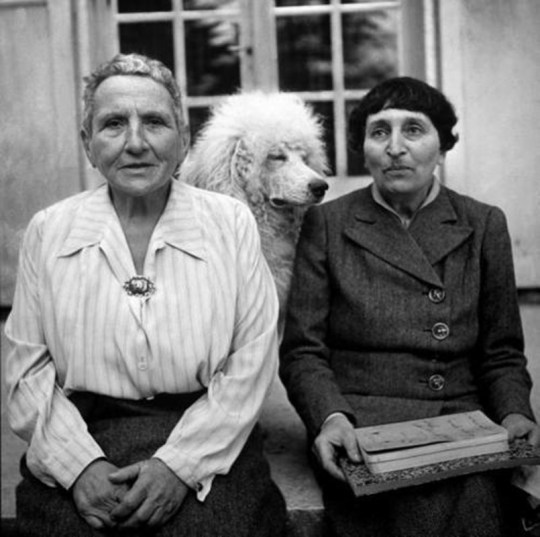
Gertrude Stein and Alice B. Toklas pictured with their pet poodle, Basket.
-LC
#365daysoflesbians#gertrude stein#lesbian history#queer history#queer#lesbian#women's history#wlw history#19th century#20th century#France#literature#usa#people#alice b toklas#wlw#writer#modernism
134 notes
·
View notes
Text
Donald Trump, the Master Trumppeteer, pulling all the Strings
Perhaps people wonder if someone else may be behind the scenes masterminding Trumps’s thoughts and actions, maybe a secreted political entity is in his ear… But in my opinion it’s all Trump -by himself, all the time. So along this concept I came up with this recent satirical drawing depicting our President Trump as a master puppeteer fully manipulating his own puppet (in his likeness) with the puppet having a mobile phone for tweeting in one hand, and a big Republican stick in the other for pounding out his campaign rhetoric on the political stage. Trump’s personal theatre of sorts, and we are all required to attend… whether we wish to or not.
This “Trumppet” illustration was created for the editorial art provider, INX (inxart.com) -and is a sort digital hybrid, combining some hand drawn elements that are then scanned into Photoshop into a hierarchy of layers, with some elements drawn all digitally in Photoshop and in Adobe Illustrator, too. Some of the textures seen in the illustration are hand painted gouache on paper that are scanned into Photoshop. All the various elements are composed in Photoshop to create the final look of the illustration.
Some illustrators solely specialize in political satire and social commentary, which I do not. I am definitely not known for political satire… None the less, over the many years I’ve had quite a few assignments to create illustrations depicting politicians (and celebrities too). And since I have the ability to easily render likenesses, I always enjoy such assignments. Since staring my illustration career right after graduating from Parsons School of Design in 1979 I’ve created occasional political themed illustrations for various publications, of: Reagan, Bush Sr., Clinton, Bush Jr., Obama, and now of Trump… Early in my career the most notable client was The New York Times where I created numerous Op/Ed Page drawings, a couple times depicting then President at the time, Ronald Reagan. (My illustration of Reagan seen below was not created for The NY Times, it was created for another publication, the name of which I cannot remember.)
Here is a link to another recent satirical illustration I created, this one depicting Trump’s recent trip to Tokyo to attend a Sumo Tournament.
But like I said… satirical illustration, especially political commentary drawings are not my artistic forte! So visit my web site to see my many popular picture books for kids, as well as my work for advertising and magazines, etc…
stevensalerno.com
0 notes
Text
Action Comics Presents The End of The New 52 As We Know It
SPOILER WARNING: The following article contains major spoilers for “Action Comics” #976 by Dan Jurgens, Doug Mahnke, Jaime Mendoza, and Wil Quintana
The conclusion of the Superman-centric crossover story arc “Superman Reborn” has arrived in “Action Comics” #976, bringing with it some massive changes to the Man of Steel’s status quo in the past, present and future, as well as some shocking clues for the what to expect from the post-“Rebirth” DC Universe.
Identity Crisis
Picking right up from last week’s “Superman” #19, we learn that Clark’s efforts to rescue his son from Mr. Mxyzptlk’s trap have transformed both he and Lois back into their “New 52” incarnations, and unsurprisingly, those changes weren’t just cosmetic in nature. The Clark and Lois on the page, meeting Jon, are literally the resurrected versions of Clark and Lois from the main continuity of the New 52 — meaning they have no recollection of ever having been in a relationship, much less being married and having a son.
In case you need a refresher, this Clark (which is to say, the New 52 Clark) was killed just before the start of Rebirth in an event called, appropriately, “The Final Days of Superman.” Similarly, New 52 Lois was killed immediately after the start of Rebirth, in “Superwoman” #1, leaving the only active Superman and Lois Lane in the Rebirth line the married pair who were shifted to the Rebirth universe with their son, Jon, from the formerly alternate pre-Flashpoint universe. Since Rebirth began, this version of Clark and Lois have slotted into the vacancies left by their dead counterparts with only a few minor hiccups, including gaining the trust Batman, figuring out how to fit in at the new Daily Planet, etc.
If you think that sounds a little morbid and a little, well, tricky to keep track of, you wouldn’t be wrong. The dissonance found in knowing Clark and Lois have been existing in Rebirth, literally replacing people’s dead friends and coworkers, has been a pretty common off-and-on thematic undercurrent in nearly all the main Super-family titles. But now, it would seem, the coin has been flipped and the replace-ers have become the replace-ees — that is, at least, until Jon gets to have his say in the matter.
Puppet Masters
New 52 Superman is understandably confused and enraged to have been dragged back into being by an imp from the 5th Dimension that he’s never met, with a coworker he only barely associates with, and a child claiming to be his and said coworker’s son. Clark rounds on Mxy, only to be met with typical Mxyzptlk rejoinders, questioning the nature of his reality and identity, claiming that any real answers he provides Clark will be met with trouble.
More specifically, trouble from “him.” Mxy claims that if he explains any of what’s going on beyond the confines of his own little extra-dimensional game, he’s going to attract some unwelcome attention from the person responsible for this whole universe-twisting debacle in the first place.
He doesn’t offer any more hints about this mysterious entity’s identity, so it’s unclear if he’s talking about Mr. Oz or another party, but whoever it is, Mxy is clearly desperately afraid of him — a fact that’s as concerning as it is interesting, given Mxy’s continuous meta-commentary on the very nature of the DC Universe from a perspective that feels almost editorial in nature.
As it happens, Mxyzptlk’s pseudo-editorial jabs were only the tip of the meta-ice burg.
The Children Are The Future
In his desperation, Jon is able to make contact with a set of strange blue lights, similar to the red lights he interacted with upon his teleportation into Mxy’s game. As he tries to speak with them, they slowly take more humanoid shapes and reveal themselves to be none other than the “echoes” of his parents, apparently reaching out from beyond whatever extra-dimensional limbo they’ve been caught in.
The light “remnants” of Jon’s Clark and Lois are able to bestow power in their son to help them “become whole again.” These powers allow Jon to not only genuinely hurt Mxyzptlk, but also fuse their remnants with their New 52 counterparts.
Which, of course, is exactly what he does. After forcing Mxy into a hasty retreat, Jon turns his attention back to his parents to, well, “fix” them.
The two sets of Clark and Lois are merged into one, a shockingly literal move to apparently begin to “delete” all vestiges of New 52 from continuity. The merging prompts a complete reconstruction of their history, apparently overwriting nearly everything that happened between 2011 and 2016, or at least somehow combining that with the experiences of Jon’s parents.
In Mr. Oz’s words, Jon has “realigned (…) the memories and experiences of all (…) so it all fits,” but the specifics are still a bit vague. A double-page spread hits the highlights of the new status quo in a sort of timeline — everything from Clark’s origin story, to Ma and Pa Kent, to “The Death of Superman” and Jon’s own birth — but doesn’t explicitly explain how this new history affects the rest of the DCU. The idea is, clearly, that at some point, everyone will suddenly have their memories altered right along with the Kents and their friends (“everything solidified, locked into place”), but that poses more than a few complications for characters who have yet to have their own New 52 stories modified in ways that fit into the new (old?) past.
With the imminent arrival of April’s “Batman” and ”Flash” crossover “The Button,” it seems all the more probable that we are going to see similar efforts to delete and re-write the New 52 history for the rest of DC’s major characters in the coming months. After all, DC is certainly no stranger to the merging and re-aligning of multiple continuities, even if taking it on a character-by-character basis is a different approach to the endeavor.
Regardless of how it transpires, the message is clear: the New 52 as we know it is done for.
The Manhattan Project
As the dust settles, the newly restored Clark proclaims “I’m back. We’re back, and everything is going to be fine,” a statement which begs the question: Will it?
Mr. Oz doesn’t seem to think so.
The very last page of the issue is focused entirely on Oz as he watches from a distance (in his mysterious, decidedly Ozymandias-esque viewing room) and wonders if Superman actually gets the final say here, or if “he” (meaning the mastermind behind everything) does.
This narration takes place over a slow zoom to Mars, yet another piece of evidence to add to the growing pile in support of the “Dr. Manhattan caused the New 52” theories that have been swirling around since “DC Universe: Rebirth” #1. Perhaps more troubling, if it is indeed Manhattan who has been pulling the strings, these panels seem to imply that he’s located within the main universe of “Rebirth” rather than somewhere beyond it; camping out in the solar system, just a hop-skip-and-jump away from Earth.
If “he” — Dr. Manhattan or otherwise — really is that close to home, it would seem a counter offensive is bound to happen sooner rather than later. And with Jon’s new ability to “heal” the fractured universe unlikely to just fade away, it’s all the more likely that Superboy will find himself a major target in days to come.
The post Action Comics Presents The End of The New 52 As We Know It appeared first on CBR.
http://ift.tt/2n7mErp
0 notes
Text
* . . . first day at new job today. wish me luck.
4 notes
·
View notes